- Home
- Joseph Conrad
Under Western Eyes Page 3
Under Western Eyes Read online
Page 3
I
The water under the bridge ran violent and deep. Its slightly undulatingrush seemed capable of scouring out a channel for itself through solidgranite while you looked. But had it flowed through Razumov's breast,it could not have washed away the accumulated bitterness the wrecking ofhis life had deposited there.
"What is the meaning of all this?" he thought, staring downwards atthe headlong flow so smooth and clean that only the passage of a faintair-bubble, or a thin vanishing streak of foam like a white hair,disclosed its vertiginous rapidity, its terrible force. "Why has thatmeddlesome old Englishman blundered against me? And what is this sillytale of a crazy old woman?"
He was trying to think brutally on purpose, but he avoided any mentalreference to the young girl. "A crazy old woman," he repeated tohimself. "It is a fatality! Or ought I to despise all this as absurd?But no! I am wrong! I can't afford to despise anything. An absurdity maybe the starting-point of the most dangerous complications. How is oneto guard against it? It puts to rout one's intelligence. The moreintelligent one is the less one suspects an absurdity."
A wave of wrath choked his thoughts for a moment. It even made his bodyleaning over the parapet quiver; then he resumed his silent thinking,like a secret dialogue with himself. And even in that privacy, histhought had some reservations of which he was vaguely conscious.
"After all, this is not absurd. It is insignificant. It is absolutelyinsignificant--absolutely. The craze of an old woman--the fussyofficiousness of a blundering elderly Englishman. What devil put him inthe way? Haven't I treated him cavalierly enough? Haven't I just? That'sthe way to treat these meddlesome persons. Is it possible that he stillstands behind my back, waiting?"
Razumov felt a faint chill run down his spine. It was not fear. He wascertain that it was not fear--not fear for himself--but it was, all thesame, a sort of apprehension as if for another, for some one heknew without being able to put a name on the personality. But therecollection that the officious Englishman had a train to meettranquillized him for a time. It was too stupid to suppose that heshould be wasting his time in waiting. It was unnecessary to look roundand make sure.
But what did the man mean by his extraordinary rigmarole about thenewspaper, and that crazy old woman? he thought suddenly. It was adamnable presumption, anyhow, something that only an Englishman couldbe capable of. All this was a sort of sport for him--the sport ofrevolution--a game to look at from the height of his superiority. Andwhat on earth did he mean by his exclamation, "Won't the truth do?"
Razumov pressed his folded arms to the stone coping over which he wasleaning with force. "Won't the truth do? The truth for the crazy oldmother of the--"
The young man shuddered again. Yes. The truth would do! Apparentlyit would do. Exactly. And receive thanks, he thought, formulating theunspoken words cynically. "Fall on my neck in gratitude, no doubt," hejeered mentally. But this mood abandoned him at once. He felt sad, asif his heart had become empty suddenly. "Well, I must be cautious," heconcluded, coming to himself as though his brain had been awakened froma trance. "There is nothing, no one, too insignificant, too absurd to bedisregarded," he thought wearily. "I must be cautious."
Razumov pushed himself with his hand away from the balustrade and,retracing his steps along the bridge, walked straight to his lodgings,where, for a few days, he led a solitary and retired existence. Heneglected Peter Ivanovitch, to whom he was accredited by the Stuttgartgroup; he never went near the refugee revolutionists, to whom he hadbeen introduced on his arrival. He kept out of that world altogether.And he felt that such conduct, causing surprise and arousing suspicion,contained an element of danger for himself.
This is not to say that during these few days he never went out. I methim several times in the streets, but he gave me no recognition.Once, going home after an evening call on the ladies Haldin, I saw himcrossing the dark roadway of the Boulevard des Philosophes. He had abroad-brimmed soft hat, and the collar of his coat turned up. I watchedhim make straight for the house, but, instead of going in, he stoppedopposite the still lighted windows, and after a time went away down aside-street.
I knew that he had not been to see Mrs. Haldin yet. Miss Haldin toldme he was reluctant; moreover, the mental condition of Mrs. Haldinhad changed. She seemed to think now that her son was living, and sheperhaps awaited his arrival. Her immobility in the great arm-chair infront of the window had an air of expectancy, even when the blind wasdown and the lamps lighted.
For my part, I was convinced that she had received her death-stroke;Miss Haldin, to whom, of course, I said nothing of my forebodings,thought that no good would come from introducing Mr. Razumov just then,an opinion which I shared fully. I knew that she met the young man onthe Bastions. Once or twice I saw them strolling slowly up the mainalley. They met every day for weeks. I avoided passing that way duringthe hour when Miss Haldin took her exercise there. One day, however,in a fit of absent-mindedness, I entered the gates and came upon herwalking alone. I stopped to exchange a few words. Mr. Razumov failed toturn up, and we began to talk about him--naturally.
"Did he tell you anything definite about your brother's activities--hisend?" I ventured to ask.
"No," admitted Miss Haldin, with some hesitation. "Nothing definite."
I understood well enough that all their conversations must have beenreferred mentally to that dead man who had brought them together. Thatwas unavoidable. But it was in the living man that she was interested.That was unavoidable too, I suppose. And as I pushed my inquiriesI discovered that he had disclosed himself to her as a by no meansconventional revolutionist, contemptuous of catchwords, of theories, ofmen too. I was rather pleased at that--but I was a little puzzled.
"His mind goes forward, far ahead of the struggle," Miss Haldinexplained. "Of course, he is an actual worker too," she added.
"And do you understand him?" I inquired point-blank.
She hesitated again. "Not altogether," she murmured.
I perceived that he had fascinated her by an assumption of mysteriousreserve.
"Do you know what I think?" she went on, breaking through her reserved,almost reluctant attitude: "I think that he is observing, studying me,to discover whether I am worthy of his trust...."
"And that pleases you?"
She kept mysteriously silent for a moment. Then with energy, but in aconfidential tone--
"I am convinced;" she declared, "that this extraordinary man ismeditating some vast plan, some great undertaking; he is possessed byit--he suffers from it--and from being alone in the world."
"And so he's looking for helpers?" I commented, turning away my head.
Again there was a silence.
"Why not?" she said at last.
The dead brother, the dying mother, the foreign friend, had falleninto a distant background. But, at the same time, Peter Ivanovitch wasabsolutely nowhere now. And this thought consoled me. Yet I saw thegigantic shadow of Russian life deepening around her like the darknessof an advancing night. It would devour her presently. I inquired afterMrs. Haldin--that other victim of the deadly shade.
A remorseful uneasiness appeared in her frank eyes. Mother seemed noworse, but if I only knew what strange fancies she had sometimes! ThenMiss Haldin, glancing at her watch, declared that she could not stay amoment longer, and with a hasty hand-shake ran off lightly.
Decidedly, Mr. Razumov was not to turn up that day. Incomprehensibleyouth!
But less than an hour afterwards, while crossing the Place Mollard, Icaught sight of him boarding a South Shore tramcar.
"He's going to the Chateau Borel," I thought.
After depositing Razumov at the gates of the Chateau Borel, some halfa mile or so from the town, the car continued its journey between twostraight lines of shady trees. Across the roadway in the sunshine ashort wooden pier jutted into the shallow pale water, which farther outhad an intense blue tint contrasting unpleasantly with the green orderlyslopes on the opposite shore. The whole view, with the harbour jettiesof white stone un
derlining lividly the dark front of the town tothe left, and the expanding space of water to the right with juttingpromontories of no particular character, had the uninspiring, glitteringquality of a very fresh oleograph. Razumov turned his back on it withcontempt. He thought it odious--oppressively odious--in its unsuggestivefinish: the very perfection of mediocrity attained at last aftercenturies of toil and culture. And turning his back on it, he faced theentrance to the grounds of the Chateau Borel.
The bars of the central way and the wrought-iron arch between the darkweather-stained stone piers were very rusty; and, though fresh tracks ofwheels ran under it, the gate looked as if it had not been opened fora very long time. But close against the lodge, built of the same greystone as the piers (its windows were all boarded up), there was a smallside entrance. The bars of that were rusty too; it stood ajar and lookedas though it had not been closed for a long time. In fact, Razumov,trying to push it open a little wider, discovered it was immovable.
"Democratic virtue. There are no thieves here, apparently," he mutteredto himself, with displeasure. Before advancing into the grounds helooked back sourly at an idle working man lounging on a bench in theclean, broad avenue. The fellow had thrown his feet up; one of his armshung over the low back of the public seat; he was taking a day off inlordly repose, as if everything in sight belonged to him.
"Elector! Eligible! Enlightened!" Razumov muttered to himself. "A brute,all the same."
Razumov entered the grounds and walked fast up the wide sweep ofthe drive, trying to think of nothing--to rest his head, to rest hisemotions too. But arriving at the foot of the terrace before the househe faltered, affected physically by some invisible interference. Themysteriousness of his quickened heart-beats startled him. He stoppedshort and looked at the brick wall of the terrace, faced with shallowarches, meagrely clothed by a few unthriving creepers, with an ill-keptnarrow flower-bed along its foot.
"It is here!" he thought, with a sort of awe. "It is here--on this veryspot...."
He was tempted to flight at the mere recollection of his first meetingwith Nathalie Haldin. He confessed it to himself; but he did not move,and that not because he wished to resist an unworthy weakness, butbecause he knew that he had no place to fly to. Moreover, he couldnot leave Geneva. He recognized, even without thinking, that it wasimpossible. It would have been a fatal admission, an act of moralsuicide. It would have been also physically dangerous. Slowly heascended the stairs of the terrace, flanked by two stained greenishstone urns of funereal aspect.
Across the broad platform, where a few blades of grass sprouted on thediscoloured gravel, the door of the house, with its ground-floor windowsshuttered, faced him, wide open. He believed that his approach hadbeen noted, because, framed in the doorway, without his tall hat, PeterIvanovitch seemed to be waiting for his approach.
The ceremonious black frock-coat and the bared head of Europe's greatestfeminist accentuated the dubiousness of his status in the house rentedby Madame de S--, his Egeria. His aspect combined the formality of thecaller with the freedom of the proprietor. Florid and bearded and maskedby the dark blue glasses, he met the visitor, and at once took himfamiliarly under the arm.
Razumov suppressed every sign of repugnance by an effort which theconstant necessity of prudence had rendered almost mechanical. Andthis necessity had settled his expression in a cast of austere, almostfanatical, aloofness. The "heroic fugitive," impressed afresh by thesevere detachment of this new arrival from revolutionary Russia, took aconciliatory, even a confidential tone. Madame de S-- was resting aftera bad night. She often had bad nights. He had left his hat upstairs onthe landing and had come down to suggest to his young friend a strolland a good open-hearted talk in one of the shady alleys behind thehouse. After voicing this proposal, the great man glanced at the unmovedface by his side, and could not restrain himself from exclaiming--
"On my word, young man, you are an extraordinary person."
"I fancy you are mistaken, Peter Ivanovitch. If I were really anextraordinary person, I would not be here, walking with you in a gardenin Switzerland, Canton of Geneva, Commune of--what's the name of theCommune this place belongs to?... Never mind--the heart of democracy,anyhow. A fit heart for it; no bigger than a parched pea and about asmuch value. I am no more extraordinary than the rest of us Russians,wandering abroad."
But Peter Ivanovitch dissented emphatically--
"No! No! You are not ordinary. I have some experience of Russians whoare--well--living abroad. You appear to me, and to others too, a markedpersonality."
"What does he mean by this?" Razumov asked himself, turning his eyesfully on his companion. The face of Peter Ivanovitch expressed ameditative seriousness.
"You don't suppose, Kirylo Sidorovitch, that I have not heard of youfrom various points where you made yourself known on your way here? Ihave had letters."
"Oh, we are great in talking about each other," interjected Razumov, whohad listened with great attention. "Gossip, tales, suspicions, andall that sort of thing, we know how to deal in to perfection. Calumny,even."
In indulging in this sally, Razumov managed very well to conceal thefeeling of anxiety which had come over him. At the same time he wassaying to himself that there could be no earthly reason for anxiety. Hewas relieved by the evident sincerity of the protesting voice.
"Heavens!" cried Peter Ivanovitch. "What are you talking about? Whatreason can _you_ have to...?"
The great exile flung up his arms as if words had failed him in sobertruth. Razumov was satisfied. Yet he was moved to continue in the samevein.
"I am talking of the poisonous plants which flourish in the world ofconspirators, like evil mushrooms in a dark cellar."
"You are casting aspersions," remonstrated Peter Ivanovitch, "which asfar as you are concerned--"
"No!" Razumov interrupted without heat. "Indeed, I don't want to castaspersions, but it's just as well to have no illusions."
Peter Ivanovitch gave him an inscrutable glance of his dark spectacles,accompanied by a faint smile.
"The man who says that he has no illusions has at least that one," hesaid, in a very friendly tone. "But I see how it is, Kirylo Sidorovitch.You aim at stoicism."
"Stoicism! That's a pose of the Greeks and the Romans. Let's leaveit to them. We are Russians, that is--children; that is--sincere; thatis--cynical, if you like. But that's not a pose."
A long silence ensued. They strolled slowly under the lime-trees.Peter Ivanovitch had put his hands behind his back. Razumov felt theungravelled ground of the deeply shaded walk damp and as if slipperyunder his feet. He asked himself, with uneasiness, if he were saying theright things. The direction of the conversation ought to have been moreunder his control, he reflected. The great man appeared to be reflectingon his side too. He cleared his throat slightly, and Razumov felt atonce a painful reawakening of scorn and fear.
"I am astonished," began Peter Ivanovitch gently. "Supposing you areright in your indictment, how can you raise any question of calumnyor gossip, in your case? It is unreasonable. The fact is, KiryloSidorovitch, there is not enough known of you to give hold to gossip oreven calumny. Just now you are a man associated with a great deed, whichhad been hoped for, and tried for too, without success. People haveperished for attempting that which you and Haldin have done at last. Youcome to us out of Russia, with that prestige. But you cannot deny thatyou have not been communicative, Kirylo Sidorovitch. People you have metimparted their impressions to me; one wrote this, another that, but Iform my own opinions. I waited to see you first. You are a man outof the common. That's positively so. You are close, very close. Thistaciturnity, this severe brow, this something inflexible and secret inyou, inspires hopes and a little wonder as to what you may mean. Thereis something of a Brutus...."
"Pray spare me those classical allusions!" burst out Razumov nervously."What comes Junius Brutus to do here? It is ridiculous! Do you mean tosay," he added sarcastically, but lowering his voice, "that the Russianrevolutionists are all patricians
and that I am an aristocrat?"
Peter Ivanovitch, who had been helping himself with a few gestures,clasped his hands again behind his back, and made a few steps,pondering.
"Not _all_ patricians," he muttered at last. "But you, at any rate, areone of _us_."
Razumov smiled bitterly.
"To be sure my name is not Gugenheimer," he said in a sneering tone. "Iam not a democratic Jew. How can I help it? Not everybody has such luck.I have no name, I have no...."
The European celebrity showed a great concern. He stepped back a paceand his arms flew in front of his person, extended, deprecatory, almostentreating. His deep bass voice was full of pain.
"But, my dear young friend!" he cried. "My dear Kirylo Sidorovitch...."
Razumov shook his head.
"The very patronymic you are so civil as to use when addressing me Ihave no legal right to--but what of that? I don't wish to claim it.I have no father. So much the better. But I will tell you what: mymother's grandfather was a peasant--a serf. See how much I am one of_you_. I don't want anyone to claim me. But Russia _can't_ disown me.She cannot!"
Razumov struck his breast with his fist.
"I am _it_!"
Peter Ivanovitch walked on slowly, his head lowered. Razumov followed,vexed with himself. That was not the right sort of talk. All sinceritywas an imprudence. Yet one could not renounce truth altogether, hethought, with despair. Peter Ivanovitch, meditating behind his darkglasses, became to him suddenly so odious that if he had had a knife, hefancied he could have stabbed him not only without compunction, butwith a horrible, triumphant satisfaction. His imagination dwelt onthat atrocity in spite of himself. It was as if he were becominglight-headed. "It is not what is expected of me," he repeated tohimself. "It is not what is--I could get away by breaking the fasteningon the little gate I see there in the back wall. It is a flimsy lock.Nobody in the house seems to know he is here with me. Oh yes. The hat!These women would discover presently the hat he has left on the landing.They would come upon him, lying dead in this damp, gloomy shade--but Iwould be gone and no one could ever...Lord! Am I going mad?" he askedhimself in a fright.
The great man was heard--musing in an undertone.
"H'm, yes! That--no doubt--in a certain sense...." He raised hisvoice. "There is a deal of pride about you...."
The intonation of Peter Ivanovitch took on a homely, familiar ring,acknowledging, in a way, Razumov's claim to peasant descent.
"A great deal of pride, brother Kirylo. And I don't say that you have nojustification for it. I have admitted you had. I have ventured to alludeto the facts of your birth simply because I attach no mean importanceto it. You are one of us--_un des notres_. I reflect on that withsatisfaction."
"I attach some importance to it also," said Razumov quietly. "I won'teven deny that it may have some importance for you too," he continued,after a slight pause and with a touch of grimness of which he washimself aware, with some annoyance. He hoped it had escaped theperception of Peter Ivanovitch. "But suppose we talk no more about it?"
"Well, we shall not--not after this one time, Kirylo Sidorovitch,"persisted the noble arch-priest of Revolution. "This shall be the lastoccasion. You cannot believe for a moment that I had the slightest ideaof wounding your feelings. You are clearly a superior nature--that's howI read you. Quite above the common--h'm--susceptibilities. But the factis, Kirylo Sidorovitch, I don't know your susceptibilities. Nobody, outof Russia, knows much of you--as yet!"
"You have been watching me?" suggested Razumov.
"Yes."
The great man had spoken in a tone of perfect frankness, but as theyturned their faces to each other Razumov felt baffled by the darkspectacles. Under their cover, Peter Ivanovitch hinted that he had feltfor some time the need of meeting a man of energy and character, in viewof a certain project. He said nothing more precise, however; and aftersome critical remarks upon the personalities of the various membersof the committee of revolutionary action in Stuttgart, he let theconversation lapse for quite a long while. They paced the alley from endto end. Razumov, silent too, raised his eyes from time to time to cast aglance at the back of the house. It offered no sign of being inhabited.With its grimy, weather-stained walls and all the windows shuttered fromtop to bottom, it looked damp and gloomy and deserted. It might verywell have been haunted in traditional style by some doleful, groaning,futile ghost of a middle-class order. The shades evoked, as worldlyrumour had it, by Madame de S-- to meet statesmen, diplomatists,deputies of various European Parliaments, must have been of anothersort. Razumov had never seen Madame de S-- but in the carriage.
Peter Ivanovitch came out of his abstraction.
"Two things I may say to you at once. I believe, first, that neither aleader nor any decisive action can come out of the dregs of a people.Now, if you ask me what are the dregs of a people--h'm--it would taketoo long to tell. You would be surprised at the variety of ingredientsthat for me go to the making up of these dregs--of that which ought,_must_ remain at the bottom. Moreover, such a statement might be subjectto discussion. But I can tell you what is _not_ the dregs. On that itis impossible for us to disagree. The peasantry of a people is not thedregs; neither is its highest class--well--the nobility. Reflect onthat, Kirylo Sidorovitch! I believe you are well fitted for reflection.Everything in a people that is not genuine, not its own by origin ordevelopment, is--well--dirt! Intelligence in the wrong place is that.Foreign-bred doctrines are that. Dirt! Dregs! The second thing I wouldoffer to your meditation is this: that for us at this moment there yawnsa chasm between the past and the future. It can never be bridged byforeign liberalism. All attempts at it are either folly or cheating.Bridged it can never be! It has to be filled up."
A sort of sinister jocularity had crept into the tones of the burlyfeminist. He seized Razumov's arm above the elbow, and gave it a slightshake.
"Do you understand, enigmatical young man? It has got to be just filledup."
Razumov kept an unmoved countenance.
"Don't you think that I have already gone beyond meditation on thatsubject?" he said, freeing his arm by a quiet movement which increasedthe distance a little between himself and Peter Ivanovitch, as they wenton strolling abreast. And he added that surely whole cartloads of wordsand theories could never fill that chasm. No meditation was necessary.A sacrifice of many lives could alone--He fell silent without finishingthe phrase.
Peter Ivanovitch inclined his big hairy head slowly. After a moment heproposed that they should go and see if Madame de S-- was now visible.
"We shall get some tea," he said, turning out of the shaded gloomy walkwith a brisker step.
The lady companion had been on the look out. Her dark skirt whisked intothe doorway as the two men came in sight round the corner. She ran offsomewhere altogether, and had disappeared when they entered the hall. Inthe crude light falling from the dusty glass skylight upon the blackand white tessellated floor, covered with muddy tracks, their footstepsechoed faintly. The great feminist led the way up the stairs. On thebalustrade of the first-floor landing a shiny tall hat reposed, rimupwards, opposite the double door of the drawing-room, haunted, itwas said, by evoked ghosts, and frequented, it was to be supposed, byfugitive revolutionists. The cracked white paint of the panels, thetarnished gilt of the mouldings, permitted one to imagine nothing butdust and emptiness within. Before turning the massive brass handle,Peter Ivanovitch gave his young companion a sharp, partly critical,partly preparatory glance.
"No one is perfect," he murmured discreetly. Thus, the possessor of arare jewel might, before opening the casket, warn the profane that nogem perhaps is flawless.
He remained with his hand on the door-handle so long that Razumovassented by a moody "No."
"Perfection itself would not produce that effect," pursued PeterIvanovitch, "in a world not meant for it. But you shall find there amind--no!--the quintessence of feminine intuition which will understandany perplexity you may be suffering from by the irresistible,enlightening force of sympathy
. Nothing can remain obscure beforethat--that--inspired, yes, inspired penetration, this true light offemininity."
The gaze of the dark spectacles in its glossy steadfastness gave hisface an air of absolute conviction. Razumov felt a momentary shrinkingbefore that closed door.
"Penetration? Light," he stammered out. "Do you mean some sort ofthought-reading?"
Peter Ivanovitch seemed shocked.
"I mean something utterly different," he retorted, with a faint, pityingsmile.
Razumov began to feel angry, very much against his wish.
"This is very mysterious," he muttered through his teeth.
"You don't object to being understood, to being guided?" queried thegreat feminist. Razumov exploded in a fierce whisper.
"In what sense? Be pleased to understand that I am a serious person. Whodo you take me for?"
They looked at each other very closely. Razumov's temper was cooledby the impenetrable earnestness of the blue glasses meeting his stare.Peter Ivanovitch turned the handle at last.
"You shall know directly," he said, pushing the door open.
A low-pitched grating voice was heard within the room.
"_Enfin_."
In the doorway, his black-coated bulk blocking the view, PeterIvanovitch boomed in a hearty tone with something boastful in it.
"Yes. Here I am!"
He glanced over his shoulder at Razumov, who waited for him to move on.
"And I am bringing you a proved conspirator--a real one this time. _Unvrai celui la_."
This pause in the doorway gave the "proved conspirator" time to makesure that his face did not betray his angry curiosity and his mentaldisgust.
These sentiments stand confessed in Mr. Razumov's memorandum ofhis first interview with Madame de S--. The very words I use in mynarrative are written where their sincerity cannot be suspected. Therecord, which could not have been meant for anyone's eyes but his own,was not, I think, the outcome of that strange impulse of indiscretioncommon to men who lead secret lives, and accounting for the invariableexistence of "compromising documents" in all the plots and conspiraciesof history. Mr. Razumov looked at it, I suppose, as a man looks athimself in a mirror, with wonder, perhaps with anguish, with anger ordespair. Yes, as a threatened man may look fearfully at his own face inthe glass, formulating to himself reassuring excuses for his appearancemarked by the taint of some insidious hereditary disease.
II
The Egeria of the "Russian Mazzini" produced, at first view, a strongeffect by the death-like immobility of an obviously painted face. Theeyes appeared extraordinarily brilliant. The figure, in a close-fittingdress, admirably made, but by no means fresh, had an elegant stiffness.The rasping voice inviting him to sit down; the rigidity of the uprightattitude with one arm extended along the back of the sofa, the whitegleam of the big eyeballs setting off the black, fathomless stare of theenlarged pupils, impressed Razumov more than anything he had seen sincehis hasty and secret departure from St. Petersburg. A witch in Parisianclothes, he thought. A portent! He actually hesitated in his advance,and did not even comprehend, at first, what the rasping voice wassaying.
"Sit down. Draw your chair nearer me. There--"
He sat down. At close quarters the rouged cheekbones, the wrinkles, thefine lines on each side of the vivid lips, astounded him. He was beingreceived graciously, with a smile which made him think of a grinningskull.
"We have been hearing about you for some time."
He did not know what to say, and murmured some disconnected words. Thegrinning skull effect vanished.
"And do you know that the general complaint is that you have shownyourself very reserved everywhere?"
Razumov remained silent for a time, thinking of his answer.
"I, don't you see, am a man of action," he said huskily, glancingupwards.
Peter Ivanovitch stood in portentous expectant silence by the side ofhis chair. A slight feeling of nausea came over Razumov. What could bethe relations of these two people to each other? She like a galvanizedcorpse out of some Hoffman's Tale--he the preacher of feminist gospelfor all the world, and a super-revolutionist besides! This ancient,painted mummy with unfathomable eyes, and this burly, bull-necked,deferential...what was it? Witchcraft, fascination.... "It's forher money," he thought. "She has millions!"
The walls, the floor of the room were bare like a barn. The few piecesof furniture had been discovered in the garrets and dragged down intoservice without having been properly dusted, even. It was the refuse thebanker's widow had left behind her. The windows without curtains had anindigent, sleepless look. In two of them the dirty yellowy-white blindshad been pulled down. All this spoke, not of poverty, but of sordidpenuriousness.
The hoarse voice on the sofa uttered angrily--
"You are looking round, Kirylo Sidorovitch. I have been shamefullyrobbed, positively ruined."
A rattling laugh, which seemed beyond her control, interrupted her for amoment.
"A slavish nature would find consolation in the fact that the principalrobber was an exalted and almost a sacrosanct person--a Grand Duke, infact. Do you understand, Mr. Razumov? A Grand Duke--No! You have no ideawhat thieves those people are! Downright thieves!"
Her bosom heaved, but her left arm remained rigidly extended along theback of the couch.
"You will only upset yourself," breathed out a deep voice, which, toRazumov's startled glance, seemed to proceed from under the steadyspectacles of Peter Ivanovitch, rather than from his lips, which hadhardly moved.
"What of hat? I say thieves! _Voleurs! Voleurs!_"
Razumov was quite confounded by this unexpected clamour, which had init something of wailing and croaking, and more than a suspicion ofhysteria.
"_Voleurs! Voleurs! Vol_...."
"No power on earth can rob you of your genius," shouted Peter Ivanovitchin an overpowering bass, but without stirring, without a gesture of anykind. A profound silence fell.
Razumov remained outwardly impassive. "What is the meaning of thisperformance?" he was asking himself. But with a preliminary soundof bumping outside some door behind him, the lady companion, in athreadbare black skirt and frayed blouse, came in rapidly, walking onher heels, and carrying in both hands a big Russian samovar, obviouslytoo heavy for her. Razumov made an instinctive movement to help, whichstartled her so much that she nearly dropped her hissing burden. Shemanaged, however, to land it on the table, and looked so frightened thatRazumov hastened to sit down. She produced then, from an adjacent room,four glass tumblers, a teapot, and a sugar-basin, on a black iron tray.
The rasping voice asked from the sofa abruptly--
"_Les gateaux_? Have you remembered to bring the cakes?"
Peter Ivanovitch, without a word, marched out on to the landing, andreturned instantly with a parcel wrapped up in white glazed paper, whichhe must have extracted from the interior of his hat. With imperturbablegravity he undid the string and smoothed the paper open on a part of thetable within reach of Madame de S--'s hand. The lady companion pouredout the tea, then retired into a distant corner out of everybody'ssight. From time to time Madame de S-- extended a claw-like hand,glittering with costly rings, towards the paper of cakes, took up oneand devoured it, displaying her big false teeth ghoulishly. Meantime shetalked in a hoarse tone of the political situation in the Balkans. Shebuilt great hopes on some complication in the peninsula for arousinga great movement of national indignation in Russia against "thesethieves--thieves thieves."
"You will only upset yourself," Peter Ivanovitch interposed, raisinghis glassy gaze. He smoked cigarettes and drank tea in silence,continuously. When he had finished a glass, he flourished his handabove his shoulder. At that signal the lady companion, ensconced in hercorner, with round eyes like a watchful animal, would dart out to thetable and pour him out another tumblerful.
Razumov looked at her once or twice. She was anxious, tremulous, thoughneither Madame de S-- nor Peter Ivanovitch paid the slightest attentionto her. "What have they done betwe
en them to that forlorn creature?"Razumov asked himself. "Have they terrified her out of her senses withghosts, or simply have they only been beating her?" When she gave himhis second glass of tea, he noticed that her lips trembled in the mannerof a scared person about to burst into speech. But of course she saidnothing, and retired into her corner, as if hugging to herself the smileof thanks he gave her.
"She may be worth cultivating," thought Razumov suddenly.
He was calming down, getting hold of the actuality into which he hadbeen thrown--for the first time perhaps since Victor Haldin had enteredhis room...and had gone out again. He was distinctly aware of beingthe object of the famous--or notorious--Madame de S--'s ghastlygraciousness.
Madame de S-- was pleased to discover that this young man was differentfrom the other types of revolutionist members of committees, secretemissaries, vulgar and unmannerly fugitive professors, rough students,ex-cobblers with apostolic faces, consumptive and ragged enthusiasts,Hebrew youths, common fellows of all sorts that used to come and goaround Peter Ivanovitch--fanatics, pedants, proletarians all. It waspleasant to talk to this young man of notably good appearance--forMadame de S-- was not always in a mystical state of mind. Razumov'staciturnity only excited her to a quicker, more voluble utterance. Itstill dealt with the Balkans. She knew all the statesmen of that region,Turks, Bulgarians, Montenegrins, Roumanians, Greeks, Armenians, andnondescripts, young and old, the living and the dead. With some money anintrigue could be started which would set the Peninsula in a blaze andoutrage the sentiment of the Russian people. A cry of abandoned brotherscould be raised, and then, with the nation seething with indignation, acouple of regiments or so would be enough to begin a military revolutionin St. Petersburg and make an end of these thieves....
"Apparently I've got only to sit still and listen," the silent Razumovthought to himself. "As to that hairy and obscene brute" (in such termsdid Mr. Razumov refer mentally to the popular expounder of a feministicconception of social state), "as to him, for all his cunning he tooshall speak out some day."
Razumov ceased to think for a moment. Then a sombre-toned reflectionformulated itself in his mind, ironical and bitter. "I have the gift ofinspiring confidence." He heard himself laughing aloud. It was like agoad to the painted, shiny-eyed harridan on the sofa.
"You may well laugh!" she cried hoarsely. "What else can one do!Perfect swindlers--and what base swindlers at that! CheapGermans--Holstein-Gottorps! Though, indeed, it's hardly safe to say whoand what they are. A family that counts a creature like Catherine theGreat in its ancestry--you understand!"
"You are only upsetting yourself," said Peter Ivanovitch, patiently butin a firm tone. This admonition had its usual effect on the Egeria. Shedropped her thick, discoloured eyelids and changed her position on thesofa. All her angular and lifeless movements seemed completely automaticnow that her eyes were closed. Presently she opened them very full.Peter Ivanovitch drank tea steadily, without haste.
"Well, I declare!" She addressed Razumov directly. "The people who haveseen you on your way here are right. You are very reserved. You haven'tsaid twenty words altogether since you came in. You let nothing of yourthoughts be seen in your face either."
"I have been listening, Madame," said Razumov, using French for thefirst time, hesitatingly, not being certain of his accent. But it seemedto produce an excellent impression. Madame de S-- looked meaningly intoPeter Ivanovitch's spectacles, as if to convey her conviction of thisyoung man's merit. She even nodded the least bit in his direction, andRazumov heard her murmur under her breath the words, "Later on inthe diplomatic service," which could not but refer to the favourableimpression he had made. The fantastic absurdity of it revolted himbecause it seemed to outrage his ruined hopes with the vision of amock-career. Peter Ivanovitch, impassive as though he were deaf, dranksome more tea. Razumov felt that he must say something.
"Yes," he began deliberately, as if uttering a meditated opinion."Clearly. Even in planning a purely military revolution the temper ofthe people should be taken into account."
"You have understood me perfectly. The discontent should bespiritualized. That is what the ordinary heads of revolutionarycommittees will not understand. They aren't capable of it. For instance,Mordatiev was in Geneva last month. Peter Ivanovitch brought him here.You know Mordatiev? Well, yes--you have heard of him. They call himan eagle--a hero! He has never done half as much as you have. Neverattempted--not half...."
Madame de S-- agitated herself angularly on the sofa.
"We, of course, talked to him. And do you know what he said to me?'What have we to do with Balkan intrigues? We must simply extirpate thescoundrels.' Extirpate is all very well--but what then? The imbecile!I screamed at him, 'But you must spiritualize--don't youunderstand?--spiritualize the discontent.'..."
She felt nervously in her pocket for a handkerchief; she pressed it toher lips.
"Spiritualize?" said Razumov interrogatively, watching her heavingbreast. The long ends of an old black lace scarf she wore over her headslipped off her shoulders and hung down on each side of her ghastly rosycheeks.
"An odious creature," she burst out again. "Imagine a man who takes fivelumps of sugar in his tea.... Yes, I said spiritualize! How else canyou make discontent effective and universal?"
"Listen to this, young man." Peter Ivanovitch made himself heardsolemnly. "Effective and universal."
Razumov looked at him suspiciously.
"Some say hunger will do that," he remarked.
"Yes. I know. Our people are starving in heaps. But you can't makefamine universal. And it is not despair that we want to create. There isno moral support to be got out of that. It is indignation...."
Madame de S-- let her thin, extended arm sink on her knees.
"I am not a Mordatiev," began Razumov.
"Bien sur!" murmured Madame de S--.
"Though I too am ready to say extirpate, extirpate! But in my ignoranceof political work, permit me to ask: A Balkan--well--intrigue, wouldn'tthat take a very long time?"
Peter Ivanovitch got up and moved off quietly, to stand with his face tothe window. Razumov heard a door close; he turned his head and perceivedthat the lady companion had scuttled out of the room.
"In matters of politics I am a supernaturalist." Madame de S-- brokethe silence harshly.
Peter Ivanovitch moved away from the window and struck Razumov lightlyon the shoulder. This was a signal for leaving, but at the same time headdressed Madame de S-- in a peculiar reminding tone---
"Eleanor!"
Whatever it meant, she did not seem to hear him. She leaned back in thecorner of the sofa like a wooden figure. The immovable peevishness ofthe face, framed in the limp, rusty lace, had a character of cruelty.
"As to extirpating," she croaked at the attentive Razumov, "there isonly one class in Russia which must be extirpated. Only one. And thatclass consists of only one family. You understand me? That one familymust be extirpated."
Her rigidity was frightful, like the rigor of a corpse galvanized intoharsh speech and glittering stare by the force of murderous hate. Thesight fascinated Razumov--yet he felt more self-possessed than atany other time since he had entered this weirdly bare room. He wasinterested. But the great feminist by his side again uttered hisappeal--
"Eleanor!"
She disregarded it. Her carmine lips vaticinated with an extraordinaryrapidity. The liberating spirit would use arms before which rivers wouldpart like Jordan, and ramparts fall down like the walls of Jericho. Thedeliverance from bondage would be effected by plagues and by signs, bywonders and by war. The women....
"Eleanor!"
She ceased; she had heard him at last. She pressed her hand to herforehead.
"What is it? Ah yes! That girl--the sister of...."
It was Miss Haldin that she meant. That young girl and her mother hadbeen leading a very retired life. They were provincial ladies--were theynot? The mother had been very beautiful--traces were left yet. PeterIvanovitch, when he called there f
or the first time, was greatlystruck....But the cold way they received him was really surprising.
"He is one of our national glories," Madams de S-- cried out, withsudden vehemence. "All the world listens to him."
"I don't know these ladies," said Razumov loudly rising from his chair.
"What are you saying, Kirylo Sidorovitch? I understand that she wastalking to you here, in the garden, the other day."
"Yes, in the garden," said Razumov gloomily. Then, with an effort, "Shemade herself known to me."
"And then ran away from us all," Madame de S-- continued, with ghastlyvivacity. "After coming to the very door! What a peculiar proceeding!Well, I have been a shy little provincial girl at one time. Yes,Razumov" (she fell into this familiarity intentionally, with anappalling grimace of graciousness. Razumov gave a perceptible start),"yes, that's my origin. A simple provincial family.
"You are a marvel," Peter Ivanovich uttered.
But it was to Razumov that she gave her death's-head smile. Her tone wasquite imperious.
"You must bring the wild young thing here. She is wanted. I reckon uponyour success--mind!"
"She is not a wild young thing," muttered Razumov, in a surly voice.
"Well, then--that's all the same. She may be one of these youngconceited democrats. Do you know what I think? I think she is very muchlike you in character. There is a smouldering fire of scorn in you. Youare darkly self-sufficient, but I can see your very soul."
Her shiny eyes had a dry, intense stare, which, missing Razumov, gavehim an absurd notion that she was looking at something which was visibleto her behind him. He cursed himself for an impressionable fool, andasked with forced calmness--
"What is it you see? Anything resembling me?"
She moved her rigidly set face from left to right, negatively.
"Some sort of phantom in my image?" pursued Razumov slowly. "For, Isuppose, a soul when it is seen is just that. A vain thing. There arephantoms of the living as well as of the dead."
The tenseness of Madame de S--'s stare had relaxed, and now she lookedat Razumov in a silence that became disconcerting.
"I myself have had an experience," he stammered out, as if compelled."I've seen a phantom once." The unnaturally red lips moved to frame aquestion harshly.
"Of a dead person?"
"No. Living."
"A friend?"
"No."
"An enemy?"
"I hated him."
"Ah! It was not a woman, then?"
"A woman!" repeated Razumov, his eyes looking straight into the eyesof Madame de S--. "Why should it have been a woman? And why thisconclusion? Why should I not have been able to hate a woman?"
As a matter of fact, the idea of hating a woman was new to him. At thatmoment he hated Madame de S--. But it was not exactly hate. It was morelike the abhorrence that may be caused by a wooden or plaster figure ofa repulsive kind. She moved no more than if she were such a figure; evenher eyes, whose unwinking stare plunged into his own, though shining,were lifeless, as though they were as artificial as her teeth. For thefirst time Razumov became aware of a faint perfume, but faint as it wasit nauseated him exceedingly. Again Peter Ivanovitch tapped him slightlyon the shoulder. Thereupon he bowed, and was about to turn away whenhe received the unexpected favour of a bony, inanimate hand extended tohim, with the two words in hoarse French--
"_Au revoir!_"
He bowed over the skeleton hand and left the room, escorted by the greatman, who made him go out first. The voice from the sofa cried afterthem--
"You remain here, _Pierre_."
"Certainly, _ma chere amie_."
But he left the room with Razumov, shutting the door behind him. Thelanding was prolonged into a bare corridor, right and left, desolateperspectives of white and gold decoration without a strip of carpet. Thevery light, pouring through a large window at the end, seemed dusty; anda solitary speck reposing on the balustrade of white marble--the silktop-hat of the great feminist--asserted itself extremely, black andglossy in all that crude whiteness.
Peter Ivanovitch escorted the visitor without opening his lips. Evenwhen they had reached the head of the stairs Peter Ivanovitch did notbreak the silence. Razumov's impulse to continue down the flight and outof the house without as much as a nod abandoned him suddenly. He stoppedon the first step and leaned his back against the wall. Below him thegreat hall with its chequered floor of black and white seemed absurdlylarge and like some public place where a great power of resonance awaitsthe provocation of footfalls and voices. As if afraid of awakening theloud echoes of that empty house, Razumov adopted a low tone.
"I really have no mind to turn into a dilettante spiritualist."
Peter Ivanovitch shook his head slightly, very serious.
"Or spend my time in spiritual ecstasies or sublime meditations upon thegospel of feminism," continued Razumov. "I made my way here for my shareof action--action, most respected Peter Ivanovitch! It was not the greatEuropean writer who attracted me, here, to this odious town of liberty.It was somebody much greater. It was the idea of the chief whichattracted me. There are starving young men in Russia who believe inyou so much that it seems the only thing that keeps them alive in theirmisery. Think of that, Peter Ivanovitch! No! But only think of that!"
The great man, thus entreated, perfectly motionless and silent, was thevery image of patient, placid respectability.
"Of course I don't speak of the people. They are brutes," added Razumov,in the same subdued but forcible tone. At this, a protesting murmurissued from the "heroic fugitive's" beard. A murmur of authority.
"Say--children."
"No! Brutes!" Razumov insisted bluntly.
"But they are sound, they are innocent," the great man pleaded in awhisper.
"As far as that goes, a brute is sound enough." Razumov raised hisvoice at last. "And you can't deny the natural innocence of a brute.But what's the use of disputing about names? You just try to give thesechildren the power and stature of men and see what they will be like.You just give it to them and see.... But never mind. I tell you,Peter Ivanovitch, that half a dozen young men do not come togethernowadays in a shabby student's room without your name being whispered,not as a leader of thought, but as a centre of revolutionaryenergies--the centre of action. What else has drawn me near you, do youthink? It is not what all the world knows of you, surely. It's preciselywhat the world at large does not know. I was irresistibly drawn-let ussay impelled, yes, impelled; or, rather, compelled, driven--driven,"repented Razumov loudly, and ceased, as if startled by the hollowreverberation of the word "driven" along two bare corridors and in thegreat empty hall.
Peter Ivanovitch did not seem startled in the least. The young mancould not control a dry, uneasy laugh. The great revolutionist remainedunmoved with an effect of commonplace, homely superiority.
"Curse him," said Razumov to himself, "he is waiting behind hisspectacles for me to give myself away." Then aloud, with a satanicenjoyment of the scorn prompting him to play with the greatness of thegreat man--
"Ah, Peter Ivanovitch, if you only knew the force which drew--no, which_drove_ me towards you! The irresistible force."
He did not feel any desire to laugh now. This time Peter Ivanovitchmoved his head sideways, knowingly, as much as to say, "Don't I?" Thisexpressive movement was almost imperceptible. Razumov went on in secretderision--
"All these days you have been trying to read me, Peter Ivanovitch. Thatis natural. I have perceived it and I have been frank. Perhaps you maythink I have not been very expansive? But with a man like you it was notneeded; it would have looked like an impertinence, perhaps. And besides,we Russians are prone to talk too much as a rule. I have always feltthat. And yet, as a nation, we are dumb. I assure you that I am notlikely to talk to you so much again--ha! ha!--"
Razumov, still keeping on the lower step, came a little nearer to thegreat man.
"You have been condescending enough. I quite understood it was to leadme on. You must render me the justi
ce that I have not tried to please. Ihave been impelled, compelled, or rather sent--let us say sent--towardsyou for a work that no one but myself can do. You would call it aharmless delusion: a ridiculous delusion at which you don't even smile.It is absurd of me to talk like this, yet some day you shall rememberthese words, I hope. Enough of this. Here I stand before you-confessed!But one thing more I must add to complete it: a mere blind tool I cannever consent to be."
Whatever acknowledgment Razumov was prepared for, he was not preparedto have both his hands seized in the great man's grasp. The swiftness ofthe movement was aggressive enough to startle. The burly feminist couldnot have been quicker had his purpose been to jerk Razumov treacherouslyup on the landing and bundle him behind one of the numerous closeddoors near by. This idea actually occurred to Razumov; his hands beingreleased after a darkly eloquent squeeze, he smiled, with a beatingheart, straight at the beard and the spectacles hiding that impenetrableman.
He thought to himself (it stands confessed in his handwriting), "I won'tmove from here till he either speaks or turns away. This is a duel."Many seconds passed without a sign or sound.
"Yes, yes," the great man said hurriedly, in subdued tones, as if thewhole thing had been a stolen, breathless interview. "Exactly. Cometo see us here in a few days. This must be gone into deeply--deeply,between you and me. Quite to the bottom. To the...And, by the by,you must bring along Natalia Victorovna--you know, the Haldin girl....
"Am I to take this as my first instruction from you?" inquired Razumovstiffly.
Peter Ivanovitch seemed perplexed by this new attitude.
"Ah! h'm! You are naturally the proper person--_la personne indiquee_.Every one shall be wanted presently. Every one."
He bent down from the landing over Razumov, who had lowered his eyes.
"The moment of action approaches," he murmured.
Razumov did not look up. He did not move till he heard the door of thedrawing-room close behind the greatest of feminists returning to hispainted Egeria. Then he walked down slowly into the hall. The door stoodopen, and the shadow of the house was lying aslant over the greatestpart of the terrace. While crossing it slowly, he lifted his hat andwiped his damp forehead, expelling his breath with force to get rid ofthe last vestiges of the air he had been breathing inside. He looked atthe palms of his hands, and rubbed them gently against his thighs.
He felt, bizarre as it may seem, as though another self, an independentsharer of his mind, had been able to view his whole person verydistinctly indeed. "This is curious," he thought. After a while heformulated his opinion of it in the mental ejaculation: "Beastly!"This disgust vanished before a marked uneasiness. "This is an effect ofnervous exhaustion," he reflected with weary sagacity. "How am I togo on day after day if I have no more power of resistance--moralresistance?"
He followed the path at the foot of the terrace. "Moral resistance,moral resistance;" he kept on repeating these words mentally. Moralendurance. Yes, that was the necessity of the situation. An immenselonging to make his way out of these grounds and to the other end of thetown, of throwing himself on his bed and going to sleep for hours, swepteverything clean out of his mind for a moment. "Is it possible that I ambut a weak creature after all?" he asked himself, in sudden alarm. "Eh!What's that?"
He gave a start as if awakened from a dream. He even swayed a littlebefore recovering himself.
"Ah! You stole away from us quietly to walk about here," he said.
The lady companion stood before him, but how she came there he had notthe slightest idea. Her folded arms were closely cherishing the cat.
"I have been unconscious as I walked, it's a positive fact," saidRazumov to himself in wonder. He raised his hat with marked civility.
The sallow woman blushed duskily. She had her invariably scaredexpression, as if somebody had just disclosed to her some terrible news.But she held her ground, Razumov noticed, without timidity. "She isincredibly shabby," he thought. In the sunlight her black costume lookedgreenish, with here and there threadbare patches where the stuff seemeddecomposed by age into a velvety, black, furry state. Her very hair andeyebrows looked shabby. Razumov wondered whether she were sixty yearsold. Her figure, though, was young enough. He observed that she did notappear starved, but rather as if she had been fed on unwholesome scrapsand leavings of plates.
Razumov smiled amiably and moved out of her way. She turned her head tokeep her scared eyes on him.
"I know what you have been told in there," she affirmed, withoutpreliminaries. Her tone, in contrast with her manner, had anunexpectedly assured character which put Razumov at his ease.
"Do you? You must have heard all sorts of talk on many occasions inthere."
She varied her phrase, with the same incongruous effect of positiveness.
"I know to a certainty what you have been told to do."
"Really?" Razumov shrugged his shoulders a little. He was about to passon with a bow, when a sudden thought struck him. "Yes. To be sure! Inyour confidential position you are aware of many things," he murmured,looking at the cat.
That animal got a momentary convulsive hug from the lady companion.
"Everything was disclosed to me a long time ago," she said.
"Everything," Razumov repeated absently.
"Peter Ivanovitch is an awful despot," she jerked out.
Razumov went on studying the stripes on the grey fur of the cat.
"An iron will is an integral part of such a temperament. How else couldhe be a leader? And I think that you are mistaken in--"
"There!" she cried. "You tell me that I am mistaken. But I tell you allthe same that he cares for no one." She jerked her head up. "Don't youbring that girl here. That's what you have been told to do--to bringthat girl here. Listen to me; you had better tie a stone round her neckand throw her into the lake."
Razumov had a sensation of chill and gloom, as if a heavy cloud hadpassed over the sun.
"The girl?" he said. "What have I to do with her?"
"But you have been told to bring Nathalie Haldin here. Am I not right?Of course I am right. I was not in the room, but I know. I know PeterIvanovitch sufficiently well. He is a great man. Great men are horrible.Well, that's it. Have nothing to do with her. That's the best youcan do, unless you want her to become like me--disillusioned!Disillusioned!"
"Like you," repeated Razumov, glaring at her face, as devoid of allcomeliness of feature and complexion as the most miserable beggar isof money. He smiled, still feeling chilly: a peculiar sensation whichannoyed him. "Disillusioned as to Peter Ivanovitch! Is that all you havelost?"
She declared, looking frightened, but with immense conviction, "PeterIvanovitch stands for everything." Then she added, in another tone,"Keep the girl away from this house."
"And are you absolutely inciting me to disobey Peter Ivanovitch justbecause--because you are disillusioned?"
She began to blink.
"Directly I saw you for the first time I was comforted. You took yourhat off to me. You looked as if one could trust you. Oh!"
She shrank before Razumov's savage snarl of, "I have heard somethinglike this before."
She was so confounded that she could do nothing but blink for a longtime.
"It was your humane manner," she explained plaintively. "I have beenstarving for, I won't say kindness, but just for a little civility, forI don't know how long. And now you are angry...."
"But no, on the contrary," he protested. "I am very glad you trust me.It's possible that later on I may..."
"Yes, if you were to get ill," she interrupted eagerly, "or meet somebitter trouble, you would find I am not a useless fool. You have only tolet me know. I will come to you. I will indeed. And I will stick to you.Misery and I are old acquaintances--but this life here is worse thanstarving."
She paused anxiously, then in a voice for the first time sounding reallytimid, she added--
"Or if you were engaged in some dangerous work. Sometimes a humblecompanion--I would not want to know anything. I
would follow you withjoy. I could carry out orders. I have the courage."
Razumov looked attentively at the scared round eyes, at the withered,sallow, round cheeks. They were quivering about the corners of themouth.
"She wants to escape from here," he thought.
"Suppose I were to tell you that I am engaged in dangerous work?" heuttered slowly.
She pressed the cat to her threadbare bosom with a breathlessexclamation. "Ah!" Then not much above a whisper: "Under PeterIvanovitch?"
"No, not under Peter Ivanovitch."
He read admiration in her eyes, and made an effort to smile.
"Then--alone?"
He held up his closed hand with the index raised. "Like this finger," hesaid.
She was trembling slightly. But it occurred to Razumov that they mighthave been observed from the house, and he became anxious to be gone. Sheblinked, raising up to him her puckered face, and seemed to beg mutelyto be told something more, to be given a word of encouragement for herstarving, grotesque, and pathetic devotion.
"Can we be seen from the house?" asked Razumov confidentially.
She answered, without showing the slightest surprise at the question--
"No, we can't, on account of this end of the stables." And she added,with an acuteness which surprised Razumov, "But anybody looking out ofan upstairs window would know that you have not passed through the gatesyet."
"Who's likely to spy out of the window?" queried Razumov. "PeterIvanovitch?"
She nodded.
"Why should he trouble his head?"
"He expects somebody this afternoon."
"You know the person?"
"There's more than one."
She had lowered her eyelids. Razumov looked at her curiously.
"Of course. You hear everything they say."
She murmured without any animosity--
"So do the tables and chairs."
He understood that the bitterness accumulated in the heart of thathelpless creature had got into her veins, and, like some subtle poison,had decomposed her fidelity to that hateful pair. It was a great pieceof luck for him, he reflected; because women are seldom venal after themanner of men, who can be bought for material considerations. She wouldbe a good ally, though it was not likely that she was allowed to hearas much as the tables and chairs of the Chateau Borel. That could not beexpected. But still.... And, at any rate, she could be made to talk.
When she looked up her eyes met the fixed stare of Razumov, who began tospeak at once.
"Well, well, dear...but upon my word, I haven't the pleasure ofknowing your name yet. Isn't it strange?"
For the first time she made a movement of the shoulders.
"Is it strange? No one is told my name. No one cares. No one talks tome, no one writes to me. My parents don't even know if I'm alive. I haveno use for a name, and I have almost forgotten it myself."
Razumov murmured gravely, "Yes, but still..."
She went on much slower, with indifference--
"You may call me Tekla, then. My poor Andrei called me so. I was devotedto him. He lived in wretchedness and suffering, and died in misery. Thatis the lot of all us Russians, nameless Russians. There is nothing elsefor us, and no hope anywhere, unless..."
"Unless what?"
"Unless all these people with names are done away with," she finished,blinking and pursing up her lips.
"It will be easier to call you Tekla, as you direct me," saidRazumov, "if you consent to call me Kirylo, when we are talking likethis--quietly--only you and me."
And he said to himself, "Here's a being who must be terribly afraid ofthe world, else she would have run away from this situation before."Then he reflected that the mere fact of leaving the great man abruptlywould make her a suspect. She could expect no support or countenancefrom anyone. This revolutionist was not fit for an independentexistence.
She moved with him a few steps, blinking and nursing the cat with asmall balancing movement of her arms.
"Yes--only you and I. That's how I was with my poor Andrei, only he wasdying, killed by these official brutes--while you! You are strong. Youkill the monsters. You have done a great deed. Peter Ivanovitch himselfmust consider you. Well--don't forget me--especially if you are goingback to work in Russia. I could follow you, carrying anything thatwas wanted--at a distance, you know. Or I could watch for hours at thecorner of a street if necessary,--in wet or snow--yes, I could--all daylong. Or I could write for you dangerous documents, lists of names orinstructions, so that in case of mischance the handwriting could notcompromise you. And you need not be afraid if they were to catch me. Iwould know how to keep dumb. We women are not so easily daunted by pain.I heard Peter Ivanovitch say it is our blunt nerves or something. We canstand it better. And it's true; I would just as soon bite my tongue outand throw it at them as not. What's the good of speech to me? Who wouldever want to hear what I could say? Ever since I closed the eyes of mypoor Andrei I haven't met a man who seemed to care for the sound ofmy voice. I should never have spoken to you if the very first time youappeared here you had not taken notice of me so nicely. I could not helpspeaking of you to that charming dear girl. Oh, the sweet creature! Andstrong! One can see that at once. If you have a heart don't let her sether foot in here. Good-bye!"
Razumov caught her by the arm. Her emotion at being thus seizedmanifested itself by a short struggle, after which she stood still, notlooking at him.
"But you can tell me," he spoke in her ear, "why they--these people inthat house there--are so anxious to get hold of her?"
She freed herself to turn upon him, as if made angry by the question.
"Don't you understand that Peter Ivanovitch must direct, inspire,influence? It is the breath of his life. There can never be too manydisciples. He can't bear thinking of anyone escaping him. And a woman,too! There is nothing to be done without women, he says. He has writtenit. He--"
The young man was staring at her passion when she broke off suddenly andran away behind the stable.
III
Razumov, thus left to himself, took the direction of the gate. But onthis day of many conversations, he discovered that very probably hecould not leave the grounds without having to hold another one.
Stepping in view from beyond the lodge appeared the expected visitorsof Peter Ivanovitch: a small party composed of two men and a woman. Theynoticed him too, immediately, and stopped short as if to consult. But ina moment the woman, moving aside, motioned with her arm to the two men,who, leaving the drive at once, struck across the large neglectedlawn, or rather grass-plot, and made directly for the house. The womanremained on the path waiting for Razumov's approach. She had recognizedhim. He, too, had recognized her at the first glance. He had been madeknown to her at Zurich, where he had broken his journey while on hisway from Dresden. They had been much together for the three days of hisstay.
She was wearing the very same costume in which he had seen her first. Ablouse of crimson silk made her noticeable at a distance. With thatshe wore a short brown skirt and a leather belt. Her complexion wasthe colour of coffee and milk, but very clear; her eyes black andglittering, her figure erect. A lot of thick hair, nearly white, wasdone up loosely under a dusty Tyrolese hat of dark cloth, which seemedto have lost some of its trimmings.
The expression of her face was grave, intent; so grave that Razumov,after approaching her close, felt obliged to smile. She greeted him witha manly hand-grasp.
"What! Are you going away?" she exclaimed. "How is that, Razumov?"
"I am going away because I haven't been asked to stay," Razumovanswered, returning the pressure of her hand with much less force thanshe had put into it.
She jerked her head sideways like one who understands. MeantimeRazumov's eyes had strayed after the two men. They were crossing thegrass-plot obliquely, without haste. The shorter of the two was buttonedup in a narrow overcoat of some thin grey material, which came nearlyto his heels. His companion, much taller and broader, wore a short,close-fitting jacket
and tight trousers tucked into shabby top-boots.
The woman, who had sent them out of Razumov's way apparently, spoke in abusinesslike voice.
"I had to come rushing from Zurich on purpose to meet the train and takethese two along here to see Peter Ivanovitch. I've just managed it."
"Ah! indeed," Razumov said perfunctorily, and very vexed at her stayingbehind to talk to him "From Zurich--yes, of course. And these two, theycome from...."
She interrupted, without emphasis--
"From quite another direction. From a distance, too. A considerabledistance."
Razumov shrugged his shoulders. The two men from a distance, afterhaving reached the wall of the terrace, disappeared suddenly at its footas if the earth had opened to swallow them up.
"Oh, well, they have just come from America." The woman in the crimsonblouse shrugged her shoulders too a little before making that statement."The time is drawing near," she interjected, as if speaking to herself."I did not tell them who you were. Yakovlitch would have wanted toembrace you."
"Is that he with the wisp of hair hanging from his chin, in the longcoat?"
"You've guessed aright. That's Yakovlitch."
"And they could not find their way here from the station without youcoming on purpose from Zurich to show it to them? Verily, without womenwe can do nothing. So it stands written, and apparently so it is."
He was conscious of an immense lassitude under his effort to besarcastic. And he could see that she had detected it with those steady,brilliant black eyes.
"What is the matter with you?"
"I don't know. Nothing. I've had a devil of a day."
She waited, with her black eyes fixed on his face. Then--
"What of that? You men are so impressionable and self-conscious. One dayis like another, hard, hard--and there's an end of it, till the greatday comes. I came over for a very good reason. They wrote to warn PeterIvanovitch of their arrival. But where from? Only from Cherbourg on abit of ship's notepaper. Anybody could have done that. Yakovlitch haslived for years and years in America. I am the only one at hand who hadknown him well in the old days. I knew him very well indeed. So PeterIvanovitch telegraphed, asking me to come. It's natural enough, is itnot?"
"You came to vouch for his identity?" inquired Razumov.
"Yes. Something of the kind. Fifteen years of a life like his makechanges in a man. Lonely, like a crow in a strange country. When I thinkof Yakovlitch before he went to America--"
The softness of the low tone caused Razumov to glance at her sideways.She sighed; her black eyes were looking away; she had plunged thefingers of her right hand deep into the mass of nearly white hair, andstirred them there absently. When she withdrew her hand the little hatperched on the top of her head remained slightly tilted, with a queerinquisitive effect, contrasting strongly with the reminiscent murmurthat escaped her.
"We were not in our first youth even then. But a man is a child always."
Razumov thought suddenly, "They have been living together." Then aloud--
"Why didn't you follow him to America?" he asked point-blank.
She looked up at him with a perturbed air.
"Don't you remember what was going on fifteen years ago? It was a timeof activity. The Revolution has its history by this time. You are init and yet you don't seem to know it. Yakovlitch went away then on amission; I went back to Russia. It had to be so. Afterwards there wasnothing for him to come back to."
"Ah! indeed," muttered Razumov, with affected surprise. "Nothing!"
"What are you trying to insinuate" she exclaimed quickly. "Well, andwhat then if he did get discouraged a little...."
"He looks like a Yankee, with that goatee hanging from his chin. Aregular Uncle Sam," growled Razumov. "Well, and you? You who went toRussia? You did not get discouraged."
"Never mind. Yakovlitch is a man who cannot be doubted. He, at any rate,is the right sort."
Her black, penetrating gaze remained fixed upon Razumov while she spoke,and for a moment afterwards.
"Pardon me," Razumov inquired coldly, "but does it mean that you, forinstance, think that I am not the right sort?"
She made no protest, gave no sign of having heard the question;she continued looking at him in a manner which he judged not to beabsolutely unfriendly. In Zurich when he passed through she had takenhim under her charge, in a way, and was with him from morning till nightduring his stay of two days. She took him round to see several people.At first she talked to him a great deal and rather unreservedly, butalways avoiding all reference to herself; towards the middle of thesecond day she fell silent, attending him zealously as before, and evenseeing him off at the railway station, where she pressed his hand firmlythrough the lowered carriage window, and, stepping back without a word,waited till the train moved. He had noticed that she was treated withquiet regard. He knew nothing of her parentage, nothing of her privatehistory or political record; he judged her from his own private point ofview, as being a distinct danger in his path. "Judged" is not perhapsthe right word. It was more of a feeling, the summing up of slightimpressions aided by the discovery that he could not despise her as hedespised all the others. He had not expected to see her again so soon.
No, decidedly; her expression was not unfriendly. Yet he perceived anacceleration in the beat of his heart. The conversation could not beabandoned at that point. He went on in accents of scrupulous inquiry--
"Is it perhaps because I don't seem to accept blindly every developmentof the general doctrine--such for instance as the feminism of our greatPeter Ivanovitch? If that is what makes me suspect, then I can only sayI would scorn to be a slave even to an idea."
She had been looking at him all the time, not as a listener looksat one, but as if the words he chose to say were only of secondaryinterest. When he finished she slipped her hand, by a sudden and decidedmovement, under his arm and impelled him gently towards the gate of thegrounds. He felt her firmness and obeyed the impulsion at once, just asthe other two men had, a moment before, obeyed unquestioningly the waveof her hand.
They made a few steps like this.
"No, Razumov, your ideas are probably all right," she said. "You may bevaluable--very valuable. What's the matter with you is that you don'tlike us."
She released him. He met her with a frosty smile.
"Am I expected then to have love as well as convictions?"
She shrugged her shoulders.
"You know very well what I mean. People have been thinking you not quitewhole-hearted. I have heard that opinion from one side and another. ButI have understood you at the end of the first day...."
Razumov interrupted her, speaking steadily.
"I assure you that your perspicacity is at fault here."
"What phrases he uses!" she exclaimed parenthetically. "Ah! KiryloSidorovitch, you like other men are fastidious, full of self-love andafraid of trifles. Moreover, you had no training. What you want is tobe taken in hand by some woman. I am sorry I am not staying here a fewdays. I am going back to Zurich to-morrow, and shall take Yakovlitchwith me most likely."
This information relieved Razumov.
"I am sorry too," he said. "But, all the same, I don't think youunderstand me."
He breathed more freely; she did not protest, but asked, "And how didyou get on with Peter Ivanovitch? You have seen a good deal of eachother. How is it between you two?"
Not knowing what answer to make, the young man inclined his head slowly.
Her lips had been parted in expectation. She pressed them together, andseemed to reflect.
"That's all right."
This had a sound of finality, but she did not leave him. It wasimpossible to guess what she had in her mind. Razumov muttered--
"It is not of me that you should have asked that question. In a momentyou shall see Peter Ivanovitch himself, and the subject will come upnaturally. He will be curious to know what has delayed you so long inthis garden."
"No doubt Peter Ivanovitch will have something t
o say to me. Severalthings. He may even speak of you--question me. Peter Ivanovitch isinclined to trust me generally."
"Question you? That's very likely."
She smiled, half serious.
"Well--and what shall I say to him?"
"I don't know. You may tell him of your discovery."
"What's that?"
"Why--my lack of love for...."
"Oh! That's between ourselves," she interrupted, it was hard to saywhether in jest or earnest.
"I see that you want to tell Peter Ivanovitch something in my favour,"said Razumov, with grim playfulness. "Well, then, you can tell him thatI am very much in earnest about my mission. I mean to succeed."
"You have been given a mission!" she exclaimed quickly.
"It amounts to that. I have been told to bring about a certain event."
She looked at him searchingly.
"A mission," she repeated, very grave and interested all at once. "Whatsort of mission?"
"Something in the nature of propaganda work."
"Ah! Far away from here?"
"No. Not very far," said Razumov, restraining a sudden desire to laugh,although he did not feel joyous in the least.
"So!" she said thoughtfully. "Well, I am not asking questions. It'ssufficient that Peter Ivanovitch should know what each of us is doing.Everything is bound to come right in the end."
"You think so?"
"I don't think, young man. I just simply believe it."
"And is it to Peter Ivanovitch that you owe that faith?"
She did not answer the question, and they stood idle, silent, as ifreluctant to part with each other.
"That's just like a man," she murmured at last. "As if it were possibleto tell how a belief comes to one." Her thin Mephistophelian eyebrowsmoved a little. "Truly there are millions of people in Russia who wouldenvy the life of dogs in this country. It is a horror and a shame toconfess this even between ourselves. One must believe for very pity.This can't go on. No! It can't go on. For twenty years I have beencoming and going, looking neither to the left nor to the right....What are you smiling to yourself for? You are only at the beginning. Youhave begun well, but you just wait till you have trodden every particleof yourself under your feet in your comings and goings. For that iswhat it comes to. You've got to trample down every particle of your ownfeelings; for stop you cannot, you must not. I have been young, too--butperhaps you think that I am complaining-eh?"
"I don't think anything of the sort," protested Razumov indifferently.
"I dare say you don't, you dear superior creature. You don't care."
She plunged her fingers into the bunch of hair on the left side,and that brusque movement had the effect of setting the Tyrolese hatstraight on her head. She frowned under it without animosity, in themanner of an investigator. Razumov averted his face carelessly.
"You men are all alike. You mistake luck for merit. You do it in goodfaith too! I would not be too hard on you. It's masculine nature.You men are ridiculously pitiful in your aptitude to cherish childishillusions down to the very grave. There are a lot of us who have been atwork for fifteen years--I mean constantly--trying one way after another,underground and above ground, looking neither to the right nor to theleft! I can talk about it. I have been one of these that neverrested.... There! What's the use of talking.... Look at my grey hairs!And here two babies come along--I mean you and Haldin--you come alongand manage to strike a blow at the very first try."
At the name of Haldin falling from the rapid and energetic lips of thewoman revolutionist, Razumov had the usual brusque consciousness of theirrevocable. But in all the months which had passed over his head hehad become hardened to the experience. The consciousness was no longeraccompanied by the blank dismay and the blind anger of the early days.He had argued himself into new beliefs; and he had made for himself amental atmosphere of gloomy and sardonic reverie, a sort of murkymedium through which the event appeared like a featureless shadow havingvaguely the shape of a man; a shape extremely familiar, yet utterlyinexpressive, except for its air of discreet waiting in the dusk. It wasnot alarming.
"What was he like?" the woman revolutionist asked unexpectedly.
"What was he like?" echoed Razumov, making a painful effort not to turnupon her savagely. But he relieved himself by laughing a little while hestole a glance at her out of the corners of his eyes. This reception ofher inquiry disturbed her.
"How like a woman," he went on. "What is the good of concerning yourselfwith his appearance? Whatever it was, he is removed beyond all feminineinfluences now."
A frown, making three folds at the root of her nose, accentuated theMephistophelian slant of her eyebrows.
"You suffer, Razumov," she suggested, in her low, confident voice.
"What nonsense!" Razumov faced the woman fairly. "But now I think of it,I am not sure that he is beyond the influence of one woman at least; theone over there--Madame de S--, you know. Formerly the dead were allowedto rest, but now it seems they are at the beck and call of a crazy oldharridan. We revolutionists make wonderful discoveries. It is true thatthey are not exactly our own. We have nothing of our own. But couldn'tthe friend of Peter Ivanovitch satisfy your feminine curiosity? Couldn'tshe conjure him up for you?"--he jested like a man in pain.
Her concentrated frowning expression relaxed, and she said, a littlewearily, "Let us hope she will make an effort and conjure up some teafor us. But that is by no means certain. I am tired, Razumov."
"You tired! What a confession! Well, there has been tea up there. I hadsome. If you hurry on after Yakovlitch, instead of wasting your timewith such an unsatisfactory sceptical person as myself, you may find theghost of it--the cold ghost of it--still lingering in the temple. But asto you being tired I can hardly believe it. We are not supposed to be.We mustn't, We can't. The other day I read in some paper or other analarmist article on the tireless activity of the revolutionary parties.It impresses the world. It's our prestige."
"He flings out continually these flouts and sneers;" the woman in thecrimson blouse spoke as if appealing quietly to a third person, buther black eyes never left Razumov's face. "And what for, pray? Simplybecause some of his conventional notions are shocked, some of hispetty masculine standards. You might think he was one of these nervoussensitives that come to a bad end. And yet," she went on, after a short,reflective pause and changing the mode of her address, "and yet Ihave just learned something which makes me think that you are a man ofcharacter, Kirylo Sidorovitch. Yes! indeed--you are."
The mysterious positiveness of this assertion startled Razumov. Theireyes met. He looked away and, through the bars of the rusty gate, staredat the clean, wide road shaded by the leafy trees. An electric tramcar,quite empty, ran along the avenue with a metallic rustle. It seemed tohim he would have given anything to be sitting inside all alone. Hewas inexpressibly weary, weary in every fibre of his body, but he hada reason for not being the first to break off the conversation. At anyinstant, in the visionary and criminal babble of revolutionists, somemomentous words might fall on his ear; from her lips, from anybody'slips. As long as he managed to preserve a clear mind and to keep downhis irritability there was nothing to fear. The only condition ofsuccess and safety was indomitable will-power, he reminded himself.
He longed to be on the other side of the bars, as though he wereactually a prisoner within the grounds of this centre of revolutionaryplots, of this house of folly, of blindness, of villainy and crime.Silently he indulged his wounded spirit in a feeling of immense moraland mental remoteness. He did not even smile when he heard her repeatthe words--
"Yes! A strong character."
He continued to gaze through the bars like a moody prisoner, notthinking of escape, but merely pondering upon the faded memories offreedom.
"If you don't look out," he mumbled, still looking away, "you shallcertainly miss seeing as much as the mere ghost of that tea."
She was not to be shaken off in such a way. As a matter of fact he hadnot expected to succe
ed.
"Never mind, it will be no great loss. I mean the missing of her tea andonly the ghost of it at that. As to the lady, you must understand thatshe has her positive uses. See _that_, Razumov."
He turned his head at this imperative appeal and saw the womanrevolutionist making the motions of counting money into the palm of herhand.
"That's what it is. You see?"
Razumov uttered a slow "I see," and returned to his prisoner-like gazingupon the neat and shady road.
"Material means must be obtained in some way, and this is easier thanbreaking into banks. More certain too. There! I am joking.... What ishe muttering to himself now?" she cried under her breath.
"My admiration of Peter Ivanovitch's devoted self-sacrifice, that's all.It's enough to make one sick."
"Oh, you squeamish, masculine creature. Sick! Makes him sick! And whatdo you know of the truth of it? There's no looking into the secrets ofthe heart. Peter Ivanovitch knew her years ago, in his worldly days,when he was a young officer in the Guards. It is not for us to judgean inspired person. That's where you men have an advantage. You areinspired sometimes both in thought and action. I have always admittedthat when you _are_ inspired, when you manage to throw off yourmasculine cowardice and prudishness you are not to be equalled by us.Only, how seldom.... Whereas the silliest woman can always be madeof use. And why? Because we have passion, unappeasable passion.... Ishould like to know what he is smiling at?"
"I am not smiling," protested Razumov gloomily.
"Well! How is one to call it? You made some sort of face. Yes, I know!You men can love here and hate there and desire something or other--andyou make a great to-do about it, and you call it passion! Yes! Whileit lasts. But we women are in love with love, and with hate, with thesevery things I tell you, and with desire itself. That's why we can't bebribed off so easily as you men. In life, you see, there is not muchchoice. You have either to rot or to burn. And there is not one of us,painted or unpainted, that would not rather burn than rot."
She spoke with energy, but in a matter-of-fact tone. Razumov's attentionhad wandered away on a track of its own--outside the bars of thegate--but not out of earshot. He stuck his hands into the pockets of hiscoat.
"Rot or burn! Powerfully stated. Painted or unpainted. Very vigorous.Painted or...Do tell me--she would be infernally jealous of him,wouldn't she?"
"Who? What? The Baroness? Eleanor Maximovna? Jealous of PeterIvanovitch? Heavens! Are these the questions the man's mind is runningon? Such a thing is not to be thought of."
"Why? Can't a wealthy old woman be jealous? Or, are they all purespirits together?"
"But what put it into your head to ask such a question?" she wondered.
"Nothing. I just asked. Masculine frivolity, if you like."
"I don't like," she retorted at once. "It is not the time to befrivolous. What are you flinging your very heart against? Or, perhaps,you are only playing a part."
Razumov had felt that woman's observation of him like a physicalcontact, like a hand resting lightly on his shoulder. At that moment hereceived the mysterious impression of her having made up her mind for acloser grip. He stiffened himself inwardly to bear it without betrayinghimself.
"Playing a Part," he repeated, presenting to her an unmoved profile. "Itmust be done very badly since you see through the assumption."
She watched him, her forehead drawn into perpendicular folds, the thinblack eyebrows diverging upwards like the antennae of an insect. Headded hardly audibly--
"You are mistaken. I am doing it no more than the rest of us."
"Who is doing it?" she snapped out.
"Who? Everybody," he said impatiently. "You are a materialist, aren'tyou?"
"Eh! My dear soul, I have outlived all that nonsense."
"But you must remember the definition of Cabanis: 'Man is a digestivetube.' I imagine now...."
"I spit on him."
"What? On Cabanis? All right. But you can't ignore the importance of agood digestion. The joy of life--you know the joy of life?--depends ona sound stomach, whereas a bad digestion inclines one to scepticism,breeds black fancies and thoughts of death. These are facts ascertainedby physiologists. Well, I assure you that ever since I came over fromRussia I have been stuffed with indigestible foreign concoctions of themost nauseating kind--pah!"
"You are joking," she murmured incredulously. He assented in a detachedway.
"Yes. It is all a joke. It's hardly worth while talking to a man likeme. Yet for that very reason men have been known to take their ownlife."
"On the contrary, I think it is worth while talking to you."
He kept her in the corner of his eye. She seemed to be thinking out somescathing retort, but ended by only shrugging her shoulders slightly.
"Shallow talk! I suppose one must pardon this weakness in you," shesaid, putting a special accent on the last word. There was somethinganxious in her indulgent conclusion.
Razumov noted the slightest shades in this conversation, which he hadnot expected, for which he was not prepared. That was it. "I was notprepared," he said to himself. "It has taken me unawares." It seemed tohim that if he only could allow himself to pant openly like a dog for atime this oppression would pass away. "I shall never be found prepared,"he thought, with despair. He laughed a little, saying as lightly as hecould--
"Thanks. I don't ask for mercy." Then affecting a playful uneasiness,"But aren't you afraid Peter Ivanovitch might suspect us of plottingsomething unauthorized together by the gate here?"
"No, I am not afraid. You are quite safe from suspicions while you arewith me, my dear young man." The humorous gleam in her black eyes wentout. "Peter Ivanovitch trusts me," she went on, quite austerely. "Hetakes my advice. I am his right hand, as it were, in certain mostimportant things.... That amuses you what? Do you think I amboasting?"
"God forbid. I was just only saying to myself that Peter Ivanovitchseems to have solved the woman question pretty completely."
Even as he spoke he reproached himself for his words, for his tone. Allday long he had been saying the wrong things. It was folly, worse thanfolly. It was weakness; it was this disease of perversity overcoming hiswill. Was this the way to meet speeches which certainly contained thepromise of future confidences from that woman who apparently had agreat store of secret knowledge and so much influence? Why give her thispuzzling impression? But she did not seem inimical. There was no angerin her voice. It was strangely speculative.
"One does not know what to think, Razumov. You must have bittensomething bitter in your cradle." Razumov gave her a sidelong glance.
"H'm! Something bitter? That's an explanation," he muttered. "Only itwas much later. And don't you think, Sophia Antonovna, that you and Icome from the same cradle?"
The woman, whose name he had forced himself at last to pronounce (he hadexperienced a strong repugnance in letting it pass his lips), the womanrevolutionist murmured, after a pause--
"You mean--Russia?"
He disdained even to nod. She seemed softened, her black eyes verystill, as though she were pursuing the simile in her thoughts to allits tender associations. But suddenly she knitted her brows in aMephistophelian frown.
"Yes. Perhaps no wonder, then. Yes. One lies there lapped up in evils,watched over by beings that are worse than ogres, ghouls, and vampires.They must be driven away, destroyed utterly. In regard of that tasknothing else matters if men and women are determined and faithful.That's how I came to feel in the end. The great thing is not to quarrelamongst ourselves about all sorts of conventional trifles. Rememberthat, Razumov."
Razumov was not listening. He had even lost the sense of being watchedin a sort of heavy tranquillity. His uneasiness, his exasperation, hisscorn were blunted at last by all these trying hours. It seemed to himthat now they were blunted for ever. "I am a match for them all,"he thought, with a conviction too firm to be exulting. The womanrevolutionist had ceased speaking; he was not looking at her; there wasno one passing along the road. He almost fo
rgot that he was not alone.He heard her voice again, curt, businesslike, and yet betraying thehesitation which had been the real reason of her prolonged silence.
"I say, Razumov!"
Razumov, whose face was turned away from her, made a grimace like a manwho hears a false note.
"Tell me: is it true that on the very morning of the deed you actuallyattended the lectures at the University?"
An appreciable fraction of a second elapsed before the real import ofthe question reached him, like a bullet which strikes some time afterthe flash of the fired shot. Luckily his disengaged hand was readyto grip a bar of the gate. He held it with a terrible force, but hispresence of mind was gone. He could make only a sort of gurgling, grumpysound.
"Come, Kirylo Sidorovitch!" she urged him. "I know you are not aboastful man. _That_ one must say for you. You are a silent man. Toosilent, perhaps. You are feeding on some bitterness of your own. You arenot an enthusiast. You are, perhaps, all the stronger for that. But youmight tell me. One would like to understand you a little more. I was soimmensely struck.... Have you really done it?"
He got his voice back. The shot had missed him. It had been fired atrandom, altogether, more like a signal for coming to close quarters.It was to be a plain struggle for self-preservation. And she was adangerous adversary too. But he was ready for battle; he was so readythat when he turned towards her not a muscle of his face moved.
"Certainly," he said, without animation, secretly strung up butperfectly sure of himself. "Lectures--certainly, But what makes youask?"
It was she who was animated.
"I had it in a letter, written by a young man in Petersburg; one ofus, of course. You were seen--you were observed with your notebook,impassible, taking notes...."
He enveloped her with his fixed stare.
"What of that?"
"I call such coolness superb--that's all. It is a proof of uncommonstrength of character. The young man writes that nobody could haveguessed from your face and manner the part you had played only some twohours before--the great, momentous, glorious part...."
"Oh no. Nobody could have guessed," assented Razumov gravely, "because,don't you see, nobody at that time...."
"Yes, yes. But all the same you are a man of exceptional fortitude, itseems. You looked exactly as usual. It was remembered afterwards withwonder...."
"It cost me no effort," Razumov declared, with the same staring gravity.
"Then it's almost more wonderful still!" she exclaimed, and fell silentwhile Razumov asked himself whether he had not said there somethingutterly unnecessary--or even worse.
She raised her head eagerly.
"Your intention was to stay in Russia? You had planned...."
"No," interrupted Razumov without haste. "I had made no plans of anysort."
"You just simply walked away?" she struck in.
He bowed his head in slow assent. "Simply--yes." He had graduallyreleased his hold on the bar of the gate, as though he had acquired theconviction that no random shot could knock him over now. And suddenly hewas inspired to add, "The snow was coming down very thick, you know."
She had a slight appreciative movement of the head, like an expertin such enterprises, very interested, capable of taking every pointprofessionally. Razumov remembered something he had heard.
"I turned into a narrow side street, you understand," he went onnegligently, and paused as if it were not worth talking about. Then heremembered another detail and dropped it before her, like a disdainfuldole to her curiosity.
"I felt inclined to lie down and go to sleep there."
She clicked her tongue at that symptom, very struck indeed. Then--
"But the notebook! The amazing notebook, man. You don't mean to say youhad put it in your pocket beforehand!" she cried.
Razumov gave a start. It might have been a sign of impatience.
"I went home. Straight home to my rooms," he said distinctly.
"The coolness of the man! You dared?"
"Why not? I assure you I was perfectly calm. Ha! Calmer than I am nowperhaps."
"I like you much better as you are now than when you indulge that bittervein of yours, Razumov. And nobody in the house saw you return--eh? Thatmight have appeared queer."
"No one," Razumov said firmly. "Dvornik, landlady, girl, all out of theway. I went up like a shadow. It was a murky morning. The stairs weredark. I glided up like a phantom. Fate? Luck? What do you think?"
"I just see it!" The eyes of the woman revolutionist snapped darkly."Well--and then you considered...."
Razumov had it all ready in his head.
"No. I looked at my watch, since you want to know. There was just time.I took that notebook, and ran down the stairs on tiptoe. Have you everlistened to the pit-pat of a man running round and round the shaft ofa deep staircase? They have a gaslight at the bottom burning nightand day. I suppose it's gleaming down there now.... The sound diesout--the flame winks...."
He noticed the vacillation of surprise passing over the steady curiosityof the black eyes fastened on his face as if the woman revolutionistreceived the sound of his voice into her pupils instead of her ears. Hechecked himself, passed his hand over his forehead, confused, like a manwho has been dreaming aloud.
"Where could a student be running if not to his lectures in the morning?At night it's another matter. I did not care if all the house had beenthere to look at me. But I don't suppose there was anyone. It's best notto be seen or heard. Aha! The people that are neither seen nor heard arethe lucky ones--in Russia. Don't you admire my luck?"
"Astonishing," she said. "If you have luck as well as determination,then indeed you are likely to turn out an invaluable acquisition for thework in hand."
Her tone was earnest; and it seemed to Razumov that it was speculative,even as though she were already apportioning him, in her mind, his shareof the work. Her eyes were cast down. He waited, not very alert now, butwith the grip of the ever-present danger giving him an air ofattentive gravity. Who could have written about him in that letterfrom Petersburg? A fellow student, surely--some imbecile victim ofrevolutionary propaganda, some foolish slave of foreign, subversiveideals. A long, famine-stricken, red-nosed figure presented itself tohis mental search. That must have been the fellow!
He smiled inwardly at the absolute wrong-headedness of the whole thing,the self-deception of a criminal idealist shattering his existence likea thunder-clap out of a clear sky, and re-echoing amongst the wreckagein the false assumptions of those other fools. Fancy that hungry andpiteous imbecile furnishing to the curiosity of the revolutionistrefugees this utterly fantastic detail! He appreciated it as by no meansconstituting a danger. On the contrary. As things stood it was for hisadvantage rather, a piece of sinister luck which had only to be acceptedwith proper caution.
"And yet, Razumov," he heard the musing voice of the woman, "you havenot the face of a lucky man." She raised her eyes with renewed interest."And so that was the way of it. After doing your work you simply walkedoff and made for your rooms. That sort of thing succeeds sometimes. Isuppose it was agreed beforehand that, once the business over, each ofyou would go his own way?"
Razumov preserved the seriousness of his expression and the deliberate,if cautious, manner of speaking.
"Was not that the best thing to do?" he asked, in a dispassionate tone."And anyway," he added, after waiting a moment, "we did not give muchthought to what would come after. We never discussed formally any lineof conduct. It was understood, I think."
She approved his statement with slight nods.
"You, of course, wished to remain in Russia?"
"In St. Petersburg itself," emphasized Razumov. "It was the only safecourse for me. And, moreover, I had nowhere else to go."
"Yes! Yes! I know. Clearly. And the other--this wonderful Haldinappearing only to be regretted--you don't know what he intended?"
Razumov had foreseen that such a question would certainly come to meethim sooner or later. He raised his hands a little and let th
em fallhelplessly by his side--nothing more.
It was the white-haired woman conspirator who was the first to break thesilence.
"Very curious," she pronounced slowly. "And you did not think, KiryloSidorovitch, that he might perhaps wish to get in touch with you again?"
Razumov discovered that he could not suppress the trembling of his lips.But he thought that he owed it to himself to speak. A negative signwould not do again. Speak he must, if only to get at the bottom of whatthat St. Petersburg letter might have contained.
"I stayed at home next day," he said, bending down a little and plunginghis glance into the black eyes of the woman so that she should notobserve the trembling of his lips. "Yes, I stayed at home. As my actionsare remembered and written about, then perhaps you are aware that Iwas _not_ seen at the lectures next day. Eh? You didn't know? Well, Istopped at home-the live-long day."
As if moved by his agitated tone, she murmured a sympathetic "I see! Itmust have been trying enough."
"You seem to understand one's feelings," said Razumov steadily. "It wastrying. It was horrible; it was an atrocious day. It was not the last."
"Yes, I understand. Afterwards, when you heard they had got him. Don'tI know how one feels after losing a comrade in the good fight? One'sashamed of being left. And I can remember so many. Never mind. Theyshall be avenged before long. And what is death? At any rate, it is nota shameful thing like some kinds of life."
Razumov felt something stir in his breast, a sort of feeble andunpleasant tremor.
"Some kinds of life?" he repeated, looking at her searchingly.
"The subservient, submissive life. Life? No! Vegetation on the filthyheap of iniquity which the world is. Life, Razumov, not to be vile mustbe a revolt--a pitiless protest--all the time."
She calmed down, the gleam of suffused tears in her eyes dried outinstantly by the heat of her passion, and it was in her capable,businesslike manner that she went on--
"You understand me, Razumov. You are not an enthusiast, but there is animmense force of revolt in you. I felt it from the first, directly Iset my eyes on you--you remember--in Zurich. Oh! You are full of bitterrevolt. That is good. Indignation flags sometimes, revenge itself maybecome a weariness, but that uncompromising sense of necessity andjustice which armed your and Haldin's hands to strike down thatfanatical brute...for it was that--nothing but that! I have beenthinking it out. It could have been nothing else but that."
Razumov made a slight bow, the irony of which was concealed by an almostsinister immobility of feature.
"I can't speak for the dead. As for myself, I can assure you that myconduct was dictated by necessity and by the sense of--well--retributivejustice."
"Good, that," he said to himself, while her eyes rested upon him, blackand impenetrable like the mental caverns where revolutionary thoughtshould sit plotting the violent way of its dream of changes. Asif anything could be changed! In this world of men nothing can bechanged--neither happiness nor misery. They can only be displaced atthe cost of corrupted consciences and broken lives--a futile game forarrogant philosophers and sanguinary triflers. Those thoughts dartedthrough Razumov's head while he stood facing the old revolutionary hand,the respected, trusted, and influential Sophia Antonovna, whose word hadsuch a weight in the "active" section of every party. She was much morerepresentative than the great Peter Ivanovitch. Stripped of rhetoric,mysticism, and theories, she was the true spirit of destructiverevolution. And she was the personal adversary he had to meet. It gavehim a feeling of triumphant pleasure to deceive her out of her ownmouth. The epigrammatic saying that speech has been given to us for thepurpose of concealing our thoughts came into his mind. Of that cynicaltheory this was a very subtle and a very scornful application, floutingin its own words the very spirit of ruthless revolution, embodied inthat woman with her white hair and black eyebrows, like slightly sinuouslines of Indian ink, drawn together by the perpendicular folds of athoughtful frown.
"That's it. Retributive. No pity!" was the conclusion of her silence.And this once broken, she went on impulsively in short, vibratingsentences--
"Listen to my story, Razumov!..." Her father was a clever but unluckyartisan. No joy had lighted up his laborious days. He died at fifty;all the years of his life he had panted under the thumb of masters whoserapacity exacted from him the price of the water, of the salt, of thevery air he breathed; taxed the sweat of his brow and claimed the bloodof his sons. No protection, no guidance! What had society to say to him?Be submissive and be honest. If you rebel I shall kill you. If you stealI shall imprison you. But if you suffer I have nothing for you--nothingexcept perhaps a beggarly dole of bread--but no consolation for yourtrouble, no respect for your manhood, no pity for the sorrows of yourmiserable life.
And so he laboured, he suffered, and he died. He died in the hospital.Standing by the common grave she thought of his tormented existence--shesaw it whole. She reckoned the simple joys of life, the birthright ofthe humblest, of which his gentle heart had been robbed by the crime ofa society which nothing can absolve.
"Yes, Razumov," she continued, in an impressive, lowered voice, "it waslike a lurid light in which I stood, still almost a child, and cursednot the toil, not the misery which had been his lot, but the greatsocial iniquity of the system resting on unrequited toil and unpitiedsufferings. From that moment I was a revolutionist."
Razumov, trying to raise himself above the dangerous weaknesses ofcontempt or compassion, had preserved an impassive countenance. She,with an unaffected touch of mere bitterness, the first he could noticesince he had come in contact with the woman, went on--
"As I could not go to the Church where the priests of the systemexhorted such unconsidered vermin as I to resignation, I went to thesecret societies as soon as I knew how to find my way. I was sixteenyears old--no more, Razumov! And--look at my white hair."
In these last words there was neither pride nor sadness. The bitternesstoo was gone.
"There is a lot of it. I had always magnificent hair, even as a chit ofa girl. Only, at that time we were cutting it short and thinking thatthere was the first step towards crushing the social infamy. Crush theInfamy! A fine watchword! I would placard it on the walls of prisons andpalaces, carve it on hard rocks, hang it out in letters of fire on thatempty sky for a sign of hope and terror--a portent of the end...."
"You are eloquent, Sophia Antonovna," Razumov interrupted suddenly."Only, so far you seem to have been writing it in water...."
She was checked but not offended. "Who knows? Very soon it may becomea fact written all over that great land of ours," she hinted meaningly."And then one would have lived long enough. White hair won't matter."
Razumov looked at her white hair: and this mark of so many uneasy yearsseemed nothing but a testimony to the invincible vigour of revolt. Itthrew out into an astonishing relief the unwrinkled face, thebrilliant black glance, the upright compact figure, the simple,brisk self-possession of the mature personality--as though in herrevolutionary pilgrimage she had discovered the secret, not ofeverlasting youth, but of everlasting endurance.
How un-Russian she looked, thought Razumov. Her mother might have beena Jewess or an Armenian or devil knew what. He reflected that arevolutionist is seldom true to the settled type. All revolt is theexpression of strong individualism--ran his thought vaguely. Onecan tell them a mile off in any society, in any surroundings. It wasastonishing that the police....
"We shall not meet again very soon, I think," she was saying. "I amleaving to-morrow."
"For Zurich?" Razumov asked casually, but feeling relieved, not fromany distinct apprehension, but from a feeling of stress as if after awrestling match.
"Yes, Zurich--and farther on, perhaps, much farther. Another journey.When I think of all my journeys! The last must come some day. Nevermind, Razumov. We had to have a good long talk. I would have certainlytried to see you if we had not met. Peter Ivanovitch knows where youlive? Yes. I meant to have asked him--but it's better like this. Yousee, we expect two m
ore men; and I had much rather wait here talkingwith you than up there at the house with...."
Having cast a glance beyond the gate, she interrupted herself. "Herethey are," she said rapidly. "Well, Kirylo Sidorovitch, we shall have tosay good-bye, presently."
IV
In his incertitude of the ground on which he stood Razumov feltperturbed. Turning his head quickly, he saw two men on the opposite sideof the road. Seeing themselves noticed by Sophia Antonovna, they crossedover at once, and passed one after another through the little gateby the side of the empty lodge. They looked hard at the stranger, butwithout mistrust, the crimson blouse being a flaring safety signal. Thefirst, great white hairless face, double chin, prominent stomach, whichhe seemed to carry forward consciously within a strongly distendedovercoat, only nodded and averted his eyes peevishly; hiscompanion--lean, flushed cheekbones, a military red moustache below asharp, salient nose--approached at once Sophia Antonovna, greeting herwarmly. His voice was very strong but inarticulate. It sounded like adeep buzzing. The woman revolutionist was quietly cordial.
"This is Razumov," she announced in a clear voice.
The lean new-comer made an eager half-turn. "He will want to embraceme," thought our young man with a deep recoil of all his being, whilehis limbs seemed too heavy to move. But it was a groundless alarm. Hehad to do now with a generation of conspirators who did not kiss eachother on both cheeks; and raising an arm that felt like lead he droppedhis hand into a largely-outstretched palm, fleshless and hot as ifdried up by fever, giving a bony pressure, expressive, seeming to say,"Between us there's no need of words." The man had big, wide-open eyes.Razumov fancied he could see a smile behind their sadness.
"This is Razumov," Sophia Antonovna repeated loudly for the benefit ofthe fat man, who at some distance displayed the profile of his stomach.
No one moved. Everything, sounds, attitudes, movements, and immobilityseemed to be part of an experiment, the result of which was a thin voicepiping with comic peevishness--
"Oh yes! Razumov. We have been hearing of nothing but Mr. Razumov formonths. For my part, I confess I would rather have seen Haldin on thisspot instead of Mr. Razumov."
The squeaky stress put on the name "Razumov--Mr. Razumov" pierced theear ridiculously, like the falsetto of a circus clown beginning anelaborate joke. Astonishment was Razumov's first response, followed bysudden indignation.
"What's the meaning of this?" he asked in a stern tone.
"Tut! Silliness. He's always like that." Sophia Antonovna was obviouslyvexed. But she dropped the information, "Necator," from her lips justloud enough to be heard by Razumov. The abrupt squeaks of the fat manseemed to proceed from that thing like a balloon he carried under hisovercoat. The stolidity of his attitude, the big feet, the lifeless,hanging hands, the enormous bloodless cheek, the thin wisps of hairstraggling down the fat nape of the neck, fascinated Razumov into astare on the verge of horror and laughter.
Nikita, surnamed Necator, with a sinister aptness of alliteration!Razumov had heard of him. He had heard so much since crossing thefrontier of these celebrities of the militant revolution; the legends,the stories, the authentic chronicle, which now and then peeps outbefore a half-incredulous world. Razumov had heard of him. He wassupposed to have killed more, gendarmes and police agents than anyrevolutionist living. He had been entrusted with executions.
The paper with the letters N.N., the very pseudonym of murder,found pinned on the stabbed breast of a certain notorious spy (thispicturesque detail of a sensational murder case had got intothe newspapers), was the mark of his handiwork. "By order of theCommittee.--N.N." A corner of the curtain lifted to strike theimagination of the gaping world. He was said to have been innumerabletimes in and out of Russia, the Necator of bureaucrats, of provincialgovernors, of obscure informers. He lived between whiles, Razumov hadheard, on the shores of the Lake of Como, with a charming wife, devotedto the cause, and two young children. But how could that creature, sogrotesque as to set town dogs barking at its mere sight, go about onthose deadly errands and slip through the meshes of the police?
"What now? what now?" the voice squeaked. "I am only sincere. It's notdenied that the other was the leading spirit. Well, it would have beenbetter if he had been the one spared to us. More useful. I am not asentimentalist. Say what I think...only natural."
Squeak, squeak, squeak, without a gesture, without a stir--the horriblesqueaky burlesque of professional jealousy--this man of a sinisteralliterative nickname, this executioner of revolutionary verdicts, theterrifying N.N. exasperated like a fashionable tenor by the attentionattracted to the performance of an obscure amateur. Sophia Antonovnashrugged her shoulders. The comrade with the martial red moustachehurried towards Razumov full of conciliatory intentions in his strongbuzzing voice.
"Devil take it! And in this place, too, in the public street, so tospeak. But you can see yourself how it is. One of his fantastic sallies.Absolutely of no consequence."
"Pray don't concern yourself," cried Razumov, going off into a long fitof laughter. "Don't mention it."
The other, his hectic flush like a pair of burns on his cheek-bones,stared for a moment and burst out laughing too. Razumov, whose hilaritydied out all at once, made a step forward.
"Enough of this," he began in a clear, incisive voice, though he couldhardly control the trembling of his legs. "I will have no more of it. Ishall not permit anyone.... I can see very well what you are at withthose allusions.... Inquire, investigate! I defy you, but I will notbe played with."
He had spoken such words before. He had been driven to cry them out inthe face of other suspicions. It was an infernal cycle bringing roundthat protest like a fatal necessity of his existence. But it was no use.He would be always played with. Luckily life does not last for ever.
"I won't have it!" he shouted, striking his fist into the palm of hisother hand.
"Kirylo Sidorovitch--what has come to you?" The woman revolutionistinterfered with authority. They were all looking at Razumov now; theslayer of spies and gendarmes had turned about, presenting his enormousstomach in full, like a shield.
"Don't shout. There are people passing." Sophia Antonovna wasapprehensive of another outburst. A steam-launch from Monrepos hadcome to the landing-stage opposite the gate, its hoarse whistle andthe churning noise alongside all unnoticed, had landed a small bunch oflocal passengers who were dispersing their several ways. Only a specimenof early tourist in knickerbockers, conspicuous by a brand-new yellowleather glass-case, hung about for a moment, scenting something unusualabout these four people within the rusty iron gates of what looked thegrounds run wild of an unoccupied private house. Ah! If he had onlyknown what the chance of commonplace travelling had suddenly put in hisway! But he was a well-bred person; he averted his gaze and moved offwith short steps along the avenue, on the watch for a tramcar.
A gesture from Sophia Antonovna, "Leave him to me," had sent the two menaway--the buzzing of the inarticulate voice growing fainter and fainter,and the thin pipe of "What now? what's the matter?" reduced to theproportions of a squeaking toy by the distance. They had left him toher. So many things could be left safely to the experience of SophiaAntonovna. And at once, her black eyes turned to Razumov, her mind triedto get at the heart of that outburst. It had some meaning. No one isborn an active revolutionist. The change comes disturbingly, with theforce of a sudden vocation, bringing in its train agonizing doubts,assertive violences, an unstable state of the soul, till the finalappeasement of the convert in the perfect fierceness of conviction. Shehad seen--often had only divined--scores of these young men and youngwomen going through an emotional crisis. This young man looked like amoody egotist. And besides, it was a special--a unique case. She hadnever met an individuality which interested and puzzled her so much.
"Take care, Razumov, my good friend. If you carry on like this you willgo mad. You are angry with everybody and bitter with yourself, and onthe look out for something to torment yourself with."
"It's intolerable!"
Razumov could only speak in gasps. "You must admitthat I can have no illusions on the attitude which...it isn't clear...orrather only too clear."
He made a gesture of despair. It was not his courage that failed him.The choking fumes of falsehood had taken him by the throat--the thoughtof being condemned to struggle on and on in that tainted atmospherewithout the hope of ever renewing his strength by a breath of fresh air.
"A glass of cold water is what you want." Sophia Antonovna glanced upthe grounds at the house and shook her head, then out of the gate atthe brimful placidity of the lake. With a half-comical shrug of theshoulders, she gave the remedy up in the face of that abundance.
"It is you, my dear soul, who are flinging yourself at something whichdoes not exist. What is it? Self-reproach, or what? It's absurd. Youcouldn't have gone and given yourself up because your comrade wastaken."
She remonstrated with him reasonably, at some length too. He had nothingto complain of in his reception. Every new-comer was discussed more orless. Everybody had to be thoroughly understood before being accepted.No one that she could remember had been shown from the first so muchconfidence. Soon, very soon, perhaps sooner than he expected, he wouldbe given an opportunity of showing his devotion to the sacred task ofcrushing the Infamy.
Razumov, listening quietly, thought: "It may be that she is trying tolull my suspicions to sleep. On the other hand, it is obvious that mostof them are fools." He moved aside a couple of paces and, folding hisarms on his breast, leaned back against the stone pillar of the gate.
"As to what remains obscure in the fate of that poor Haldin," SophiaAntonovna dropped into a slowness of utterance which was to Razumov likethe falling of molten lead drop by drop; "as to that--though no one everhinted that either from fear or neglect your conduct has not been whatit should have been--well, I have a bit of intelligence...."
Razumov could not prevent himself from raising his head, and SophiaAntonovna nodded slightly.
"I have. You remember that letter from St. Petersburg I mentioned to youa moment ago?"
"The letter? Perfectly. Some busybody has been reporting my conduct ona certain day. It's rather sickening. I suppose our police are greatlyedified when they open these interesting and--and--superfluous letters."
"Oh dear no! The police do not get hold of our letters as easily as youimagine. The letter in question did not leave St. Petersburg till theice broke up. It went by the first English steamer which left the Nevathis spring. They have a fireman on board--one of us, in fact. It hasreached me from Hull...."
She paused as if she were surprised at the sullen fixity of Razumov'sgaze, but went on at once, and much faster.
"We have some of our people there who...but never mind. The writerof the letter relates an incident which he thinks may possibly beconnected with Haldin's arrest. I was just going to tell you when thosetwo men came along."
"That also was an incident," muttered Razumov, "of a very charmingkind--for me."
"Leave off that!" cried Sophia Antonovna. "Nobody cares for Nikita'sbarking. There's no malice in him. Listen to what I have to say. Youmay be able to throw a light. There was in St. Petersburg a sort of townpeasant--a man who owned horses. He came to town years ago to work forsome relation as a driver and ended by owning a cab or two."
She might well have spared herself the slight effort of the gesture:"Wait!" Razumov did not mean to speak; he could not have interruptedher now, not to save his life. The contraction of his facial muscles hadbeen involuntary, a mere surface stir, leaving him sullenly attentive asbefore.
"He was not a quite ordinary man of his class--it seems," she went on."The people of the house--my informant talked with many of them--youknow, one of those enormous houses of shame and misery...."
Sophia Antonovna need not have enlarged on the character of the house.Razumov saw clearly, towering at her back, a dark mass of masonry veiledin snowflakes, with the long row of windows of the eating-shop shininggreasily very near the ground. The ghost of that night pursued him. Hestood up to it with rage and with weariness.
"Did the late Haldin ever by chance speak to you of that house?" SophiaAntonovna was anxious to know.
"Yes." Razumov, making that answer, wondered whether he were fallinginto a trap. It was so humiliating to lie to these people that heprobably could not have said no. "He mentioned to me once," he added, asif making an effort of memory, "a house of that sort. He used to visitsome workmen there."
"Exactly."
Sophia Antonovna triumphed. Her correspondent had discovered that factquite accidentally from the talk of the people of the house, havingmade friends with a workman who occupied a room there. They describedHaldin's appearance perfectly. He brought comforting words of hope intotheir misery. He came irregularly, but he came very often, and--hercorrespondent wrote--sometimes he spent a night in the house, sleeping,they thought, in a stable which opened upon the inner yard.
"Note that, Razumov! In a stable."
Razumov had listened with a sort of ferocious but amused acquiescence.
"Yes. In the straw. It was probably the cleanest spot in the wholehouse."
"No doubt," assented the woman with that deep frown which seemed to drawcloser together her black eyes in a sinister fashion. No four-footedbeast could stand the filth and wretchedness so many human beings werecondemned to suffer from in Russia. The point of this discovery was thatit proved Haldin to have been familiar with that horse-owning peasant--areckless, independent, free-living fellow not much liked by the otherinhabitants of the house. He was believed to have been the associate ofa band of housebreakers. Some of these got captured. Not while he wasdriving them, however; but still there was a suspicion against thefellow of having given a hint to the police and...
The woman revolutionist checked herself suddenly.
"And you? Have you ever heard your friend refer to a certainZiemianitch?"
Razumov was ready for the name. He had been looking out for thequestion. "When it comes I shall own up," he had said to himself. But hetook his time.
"To be sure!" he began slowly. "Ziemianitch, a peasant owning a team ofhorses. Yes. On one occasion. Ziemianitch! Certainly! Ziemianitch of thehorses.... How could it have slipped my memory like this? One of thelast conversations we had together."
"That means,"--Sophia Antonovna looked very grave,--"that means,Razumov, it was very shortly before--eh?"
"Before what?" shouted Razumov, advancing at the woman, who lookedastonished but stood her ground. "Before.... Oh! Of course, it wasbefore! How could it have been after? Only a few hours before."
"And he spoke of him favourably?"
"With enthusiasm! The horses of Ziemianitch! The free soul ofZiemianitch!"
Razumov took a savage delight in the loud utterance of that name, whichhad never before crossed his lips audibly. He fixed his blazing eyeson the woman till at last her fascinated expression recalled him tohimself.
"The late Haldin," he said, holding himself in, with downcast eyes,"was inclined to take sudden fancies to people, on--on--what shall Isay--insufficient grounds."
"There!" Sophia Antonovna clapped her hands. "That, to my mind, settlesit. The suspicions of my correspondent were aroused...."
"Aha! Your correspondent," Razumov said in an almost openly mockingtone. "What suspicions? How aroused? By this Ziemianitch? Probably somedrunken, gabbling, plausible..."
"You talk as if you had known him."
Razumov looked up.
"No. But I knew Haldin."
Sophia Antonovna nodded gravely.
"I see. Every word you say confirms to my mind the suspicioncommunicated to me in that very interesting letter. This Ziemianitch wasfound one morning hanging from a hook in the stable--dead."
Razumov felt a profound trouble. It was visible, because SophiaAntonovna was moved to observe vivaciously--
"Aha! You begin to see."
He saw it clearly enough--in the light of a lantern casting spokes ofshadow in a cellar-like stable, the body in a s
heepskin coat and longboots hanging against the wall. A pointed hood, with the ends woundabout up to the eyes, hid the face. "But that does not concern me," hereflected. "It does not affect my position at all. He never knew who hadthrashed him. He could not have known." Razumov felt sorry for the oldlover of the bottle and women.
"Yes. Some of them end like that," he muttered. "What is your idea,Sophia Antonovna?"
It was really the idea of her correspondent, but Sophia Antonovna hadadopted it fully. She stated it in one word--"Remorse." Razumov openedhis eyes very wide at that. Sophia Antonovna's informant, by listeningto the talk of the house, by putting this and that together, had managedto come very near to the truth of Haldin's relation to Ziemianitch.
"It is I who can tell you what you were not certain of--that your friendhad some plan for saving himself afterwards, for getting out of St.Petersburg, at any rate. Perhaps that and no more, trusting to luck forthe rest. And that fellow's horses were part of the plan."
"They have actually got at the truth," Razumov marvelled to himself,while he nodded judicially. "Yes, that's possible, very possible." Butthe woman revolutionist was very positive that it was so. First of all,a conversation about horses between Haldin and Ziemianitch had beenpartly overheard. Then there were the suspicions of the people in thehouse when their "young gentleman" (they did not know Haldin byhis name) ceased to call at the house. Some of them used to chargeZiemianitch with knowing something of this absence. He denied it withexasperation; but the fact was that ever since Haldin's disappearance hewas not himself, growing moody and thin. Finally, during a quarrel withsome woman (to whom he was making up), in which most of the inmates ofthe house took part apparently, he was openly abused by his chief enemy,an athletic pedlar, for an informer, and for having driven "our younggentleman to Siberia, the same as you did those young fellows who brokeinto houses." In consequence of this there was a fight, and Ziemianitchgot flung down a flight of stairs. Thereupon he drank and moped for aweek, and then hanged himself.
Sophia Antonovna drew her conclusions from the tale. She chargedZiemianitch either with drunken indiscretion as to a driving job on acertain date, overheard by some spy in some low grog-shop--perhaps inthe very eating-shop on the ground floor of the house--or, maybe, adownright denunciation, followed by remorse. A man like that would becapable of anything. People said he was a flighty old chap. And if hehad been once before mixed up with the police--as seemed certain, thoughhe always denied it--in connexion with these thieves, he would be sureto be acquainted with some police underlings, always on the look out forsomething to report. Possibly at first his tale was not made anything oftill the day that scoundrel de P--- got his deserts. Ah! But then everybit and scrap of hint and information would be acted on, and fatallythey were bound to get Haldin.
Sophia Antonovna spread out her hands--"Fatally."
Fatality--chance! Razumov meditated in silent astonishment upon thequeer verisimilitude of these inferences. They were obviously to hisadvantage.
"It is right now to make this conclusive evidence known generally."Sophia Antonovna was very calm and deliberate again. She had receivedthe letter three days ago, but did not write at once to PeterIvanovitch. She knew then that she would have the opportunity presentlyof meeting several men of action assembled for an important purpose.
"I thought it would be more effective if I could show the letter itselfat large. I have it in my pocket now. You understand how pleased I wasto come upon you."
Razumov was saying to himself, "She won't offer to show the letter tome. Not likely. Has she told me everything that correspondent of hershas found out?" He longed to see the letter, but he felt he must notask.
"Tell me, please, was this an investigation ordered, as it were?"
"No, no," she protested. "There you are again with your sensitiveness.It makes you stupid. Don't you see, there was no starting-point for aninvestigation even if any one had thought of it. A perfect blank! That'sexactly what some people were pointing out as the reason for receivingyou cautiously. It was all perfectly accidental, arising from myinformant striking an acquaintance with an intelligent skindresserlodging in that particular slum-house. A wonderful coincidence!"
"A pious person," suggested Razumov, with a pale smile, "would say thatthe hand of God has done it all."
"My poor father would have said that." Sophia Antonovna did not smile.She dropped her eyes. "Not that his God ever helped him. It's a longtime since God has done anything for the people. Anyway, it's done."
"All this would be quite final," said Razumov, with every appearance ofreflective impartiality, "if there was any certitude that the 'our younggentleman' of these people was Victor Haldin. Have we got that?"
"Yes. There's no mistake. My correspondent was as familiar with Haldin'spersonal appearance as with your own," the woman affirmed decisively.
"It's the red-nosed fellow beyond a doubt," Razumov said to himself,with reawakened uneasiness. Had his own visit to that accursed housepassed unnoticed? It was barely possible. Yet it was hardly probable.It was just the right sort of food for the popular gossip that gauntbusybody had been picking up. But the letter did not seem to contain anyallusion to that. Unless she had suppressed it. And, if so, why? If ithad really escaped the prying of that hunger-stricken democrat with aconfounded genius for recognizing people from description, it couldonly be for a time. He would come upon it presently and hasten to writeanother letter--and then!
For all the envenomed recklessness of his temper, fed on hate anddisdain, Razumov shuddered inwardly. It guarded him from common fear,but it could not defend him from disgust at being dealt with in any wayby these people. It was a sort of superstitious dread. Now, since hisposition had been made more secure by their own folly at the cost ofZiemianitch, he felt the need of perfect safety, with its freedomfrom direct lying, with its power of moving amongst them silent,unquestioning, listening, impenetrable, like the very fate of theircrimes and their folly. Was this advantage his already? Or not yet? Ornever would be?
"Well, Sophia Antonovna," his air of reluctant concession was genuinein so far that he was really loath to part with her without testing hersincerity by a question it was impossible to bring about in any way;"well, Sophia Antonovna, if that is so, then--"
"The creature has done justice to himself," the woman observed, as ifthinking aloud.
"What? Ah yes! Remorse," Razumov muttered, with equivocal contempt.
"Don't be harsh, Kirylo Sidorovitch, if you have lost a friend." Therewas no hint of softness in her tone, only the black glitter of her eyesseemed detached for an instant from vengeful visions. "He was a man ofthe people. The simple Russian soul is never wholly impenitent. It'ssomething to know that."
"Consoling?" insinuated Razumov, in a tone of inquiry.
"Leave off railing," she checked him explosively. "Remember, Razumov,that women, children, and revolutionists hate irony, which is thenegation of all saving instincts, of all faith, of all devotion, of allaction. Don't rail! Leave off.... I don't know how it is, but thereare moments when you are abhorrent to me...."
She averted her face. A languid silence, as if all the electricity ofthe situation had been discharged in this flash of passion, lasted forsome time. Razumov had not flinched. Suddenly she laid the tips of herfingers on his sleeve.
"Don't mind."
"I don't mind," he said very quietly.
He was proud to feel that she could read nothing on his face. He wasreally mollified, relieved, if only for a moment, from an obscureoppression. And suddenly he asked himself, "Why the devil did I go tothat house? It was an imbecile thing to do."
A profound disgust came over him. Sophia Antonovna lingered, talkingin a friendly manner with an evident conciliatory intention. And it wasstill about the famous letter, referring to various minute detailsgiven by her informant, who had never seen Ziemianitch. The "victim ofremorse" had been buried several weeks before her correspondent beganfrequenting the house. It--the house--contained very good revolutiona
rymaterial. The spirit of the heroic Haldin had passed through these densof black wretchedness with a promise of universal redemption from allthe miseries that oppress mankind. Razumov listened without hearing,gnawed by the newborn desire of safety with its independence from thatdegrading method of direct lying which at times he found it almostimpossible to practice.
No. The point he wanted to hear about could never come into thisconversation. There was no way of bringing it forward. He regrettednot having composed a perfect story for use abroad, in which his fatalconnexion with the house might have been owned up to. But when he leftRussia he did not know that Ziemianitch had hanged himself. And, anyway,who could have foreseen this woman's "informant" stumbling upon thatparticular slum, of all the slums awaiting destruction in the purifyingflame of social revolution? Who could have foreseen? Nobody! "It's aperfect, diabolic surprise," thought Razumov, calm-faced in his attitudeof inscrutable superiority, nodding assent to Sophia Antonovna's remarksupon the psychology of "the people," "Oh yes--certainly," rathercoldly, but with a nervous longing in his fingers to tear some sort ofconfession out of her throat.
Then, at the very last, on the point of separating, the feeling ofrelaxed tension already upon him, he heard Sophia Antonovna allude tothe subject of his uneasiness. How it came about he could only guess,his mind being absent at the moment, but it must have sprung from SophiaAntonovna's complaints of the illogical absurdity of the people. Forinstance--that Ziemianitch was notoriously irreligious, and yet, in thelast weeks of his life, he suffered from the notion that he had beenbeaten by the devil.
"The devil," repeated Razumov, as though he had not heard aright.
"The actual devil. The devil in person. You may well look astonished,Kirylo Sidorovitch. Early on the very night poor Haldin was taken,a complete stranger turned up and gave Ziemianitch a most fearfulthrashing while he was lying dead-drunk in the stable. The wretchedcreature's body was one mass of bruises. He showed them to the people inthe house."
"But you, Sophia Antonovna, you don't believe in the actual devil?"
"Do you?" retorted the woman curtly. "Not but that there are plenty ofmen worse than devils to make a hell of this earth," she muttered toherself.
Razumov watched her, vigorous and white-haired, with the deep foldbetween her thin eyebrows, and her black glance turned idly away. It wasobvious that she did not make much of the story--unless, indeed, thiswas the perfection of duplicity. "A dark young man," she explainedfurther. "Never seen there before, never seen afterwards. Why are yousmiling, Razumov?"
"At the devil being still young after all these ages," he answeredcomposedly. "But who was able to describe him, since the victim, yousay, was dead-drunk at the time?"
"Oh! The eating-house keeper has described him. An overbearing,swarthy young man in a student's cloak, who came rushing in, demandedZiemianitch, beat him furiously, and rushed away without a word, leavingthe eating-house keeper paralysed with astonishment."
"Does he, too, believe it was the devil?"
"That I can't say. I am told he's very reserved on the matter. Thosesellers of spirits are great scoundrels generally. I should think heknows more of it than anybody."
"Well, and you, Sophia Antonovna, what's your theory?" asked Razumovin a tone of great interest. "Yours and your informant's, who is on thespot."
"I agree with him. Some police-hound in disguise. Who else could beat ahelpless man so unmercifully? As for the rest, if they were out that dayon every trail, old and new, it is probable enough that they mighthave thought it just as well to have Ziemianitch at hand for moreinformation, or for identification, or what not. Some scoundrellydetective was sent to fetch him along, and being vexed at finding himso drunk broke a stable fork over his ribs. Later on, after they had thebig game safe in the net, they troubled their heads no more about thatpeasant."
Such were the last words of the woman revolutionist in thisconversation, keeping so close to the truth, departing from it so far inthe verisimilitude of thoughts and conclusions as to give one the notionof the invincible nature of human error, a glimpse into the utmostdepths of self-deception. Razumov, after shaking hands with SophiaAntonovna, left the grounds, crossed the road, and walking out on thelittle steamboat pier leaned over the rail.
His mind was at ease; ease such as he had not known for many days,ever since that night...the night. The conversation with the womanrevolutionist had given him the view of his danger at the very momentthis danger vanished, characteristically enough. "I ought to haveforeseen the doubts that would arise in those people's minds," hethought. Then his attention being attracted by a stone of peculiarshape, which he could see clearly lying at the bottom, he began tospeculate as to the depth of water in that spot. But very soon, with astart of wonder at this extraordinary instance of ill-timed detachment,he returned to his train of thought. "I ought to have told verycircumstantial lies from the first," he said to himself, with a mortaldistaste of the mere idea which silenced his mental utterance for quitea perceptible interval. "Luckily, that's all right now," he reflected,and after a time spoke to himself, half aloud, "Thanks to the devil,"and laughed a little.
The end of Ziemianitch then arrested his wandering thoughts. He was notexactly amused at the interpretation, but he could not help detectingin it a certain piquancy. He owned to himself that, had he known of thatsuicide before leaving Russia, he would have been incapable of makingsuch excellent use of it for his own purposes. He ought to be infinitelyobliged to the fellow with the red nose for his patience and ingenuity,"A wonderful psychologist apparently," he said to himself sarcastically.Remorse, indeed! It was a striking example of your true conspirator'sblindness, of the stupid subtlety of people with one idea. This wasa drama of love, not of conscience, Razumov continued to himselfmockingly. A woman the old fellow was making up to! A robust pedlar,clearly a rival, throwing him down a flight of stairs.... And atsixty, for a lifelong lover, it was not an easy matter to get over.That was a feminist of a different stamp from Peter Ivanovitch. Even thecomfort of the bottle might conceivably fail him in this supremecrisis. At such an age nothing but a halter could cure the pangs ofan unquenchable passion. And, besides, there was the wild exasperationaroused by the unjust aspersions and the contumely of the house, withthe maddening impossibility to account for that mysterious thrashing,added to these simple and bitter sorrows. "Devil, eh?" Razumovexclaimed, with mental excitement, as if he had made an interestingdiscovery. "Ziemianitch ended by falling into mysticism. So many of ourtrue Russian souls end in that way! Very characteristic." He felt pityfor Ziemianitch, a large neutral pity, such as one may feel for anunconscious multitude, a great people seen from above--like a communityof crawling ants working out its destiny. It was as if this Ziemianitchcould not possibly have done anything else. And Sophia Antonovna'scocksure and contemptuous "some police-hound" was characteristicallyRussian in another way. But there was no tragedy there. This was acomedy of errors. It was as if the devil himself were playing a gamewith all of them in turn. First with him, then with Ziemianitch,then with those revolutionists. The devil's own game this.... Heinterrupted his earnest mental soliloquy with a jocular thought at hisown expense. "Hallo! I am falling into mysticism too."
His mind was more at ease than ever. Turning about he put his backagainst the rail comfortably. "All this fits with marvellous aptness,"he continued to think. "The brilliance of my reputed exploit is nolonger darkened by the fate of my supposed colleague. The mysticZiemianitch accounts for that. An incredible chance has served me. Nomore need of lies. I shall have only to listen and to keep my scorn fromgetting the upper hand of my caution."
He sighed, folded his arms, his chin dropped on his breast, and it wasa long time before he started forward from that pose, with therecollection that he had made up his mind to do something important thatday. What it was he could not immediately recall, yet he made no effortof memory, for he was uneasily certain that he would remember presently.
He had not gone more than a hundred yards towards the to
wn when heslowed down, almost faltered in his walk, at the sight of a figurewalking in the contrary direction, draped in a cloak, under a soft,broad-brimmed hat, picturesque but diminutive, as if seen through thebig end of an opera-glass. It was impossible to avoid that tiny man, forthere was no issue for retreat.
"Another one going to that mysterious meeting," thought Razumov. He wasright in his surmise, only _this_ one, unlike the others who came from adistance, was known to him personally. Still, he hoped to pass on witha mere bow, but it was impossible to ignore the little thin hand withhairy wrist and knuckles protruded in a friendly wave from under thefolds of the cloak, worn Spanish-wise, in disregard of a fairly warmday, a corner flung over the shoulder.
"And how is Herr Razumov?" sounded the greeting in German, by that alonemade more odious to the object of the affable recognition. At closerquarters the diminutive personage looked like a reduction of anordinary-sized man, with a lofty brow bared for a moment by the raisingof the hat, the great pepper-and salt full beard spread over theproportionally broad chest. A fine bold nose jutted over a thin mouthhidden in the mass of fine hair. All this, accented features, stronglimbs in their relative smallness, appeared delicate without theslightest sign of debility. The eyes alone, almond-shaped and brown,were too big, with the whites slightly bloodshot by much pen labourunder a lamp. The obscure celebrity of the tiny man was well known toRazumov. Polyglot, of unknown parentage, of indefinite nationality,anarchist, with a pedantic and ferocious temperament, and an amazinglyinflammatory capacity for invective, he was a power in the background,this violent pamphleteer clamouring for revolutionary justice, thisJulius Laspara, editor of the _Living Word_, confidant of conspirators,inditer of sanguinary menaces and manifestos, suspected of being in thesecret of every plot. Laspara lived in the old town in a sombre,narrow house presented to him by a naive middle-class admirer of hishumanitarian eloquence. With him lived his two daughters, who overtoppedhim head and shoulders, and a pasty-faced, lean boy of six, languishingin the dark rooms in blue cotton overalls and clumsy boots, who mighthave belonged to either one of them or to neither. No stranger couldtell. Julius Laspara no doubt knew which of his girls it was who, aftercasually vanishing for a few years, had as casually returned to himpossessed of that child; but, with admirable pedantry, he had refrainedfrom asking her for details--no, not so much as the name of the father,because maternity should be an anarchist function. Razumov had beenadmitted twice to that suite of several small dark rooms on the topfloor: dusty window-panes, litter of all sorts of sweepings all overthe place, half-full glasses of tea forgotten on every table, the twoLaspara daughters prowling about enigmatically silent, sleepy-eyed,corsetless, and generally, in their want of shape and the disorderof their rumpled attire, resembling old dolls; the great but obscureJulius, his feet twisted round his three-legged stool, always ready toreceive the visitors, the pen instantly dropped, the body screwed roundwith a striking display of the lofty brow and of the great austerebeard. When he got down from his stool it was as though he had descendedfrom the heights of Olympus. He was dwarfed by his daughters, by thefurniture, by any caller of ordinary stature. But he very seldom leftit, and still more rarely was seen walking in broad daylight.
It must have been some matter of serious importance which had driven himout in that direction that afternoon. Evidently he wished to be amiableto that young man whose arrival had made some sensation in the worldof political refugees. In Russian now, which he spoke, as he spoke andwrote four or five other European languages, without distinction andwithout force (other than that of invective), he inquired if Razumovhad taken his inscriptions at the University as yet. And the young man,shaking his head negatively--
"There's plenty of time for that. But, meantime, are you not going towrite something for us?"
He could not understand how any one could refrain from writing onanything, social, economic, historical--anything. Any subject could betreated in the right spirit, and for the ends of social revolution. And,as it happened, a friend of his in London had got in touch with a reviewof advanced ideas. "We must educate, educate everybody--develop thegreat thought of absolute liberty and of revolutionary justice."
Razumov muttered rather surlily that he did not even know English.
"Write in Russian. We'll have it translated There can be no difficulty.Why, without seeking further, there is Miss Haldin. My daughters go tosee her sometimes." He nodded significantly. "She does nothing, hasnever done anything in her life. She would be quite competent, with alittle assistance. Only write. You know you must. And so good-bye forthe present."
He raised his arm and went on. Razumov backed against the low wall,looked after him, spat violently, and went on his way with an angrymutter--
"Cursed Jew!"
He did not know anything about it. Julius Laspara might have been aTransylvanian, a Turk, an Andalusian, or a citizen of one of the Hansetowns for anything he could tell to the contrary. But this is not astory of the West, and this exclamation must be recorded, accompanied bythe comment that it was merely an expression of hate and contempt, bestadapted to the nature of the feelings Razumov suffered from at the time.He was boiling with rage, as though he had been grossly insulted. Hewalked as if blind, following instinctively the shore of the diminutiveharbour along the quay, through a pretty, dull garden, where dullpeople sat on chairs under the trees, till, his fury abandoning him, hediscovered himself in the middle of a long, broad bridge. He slowed downat once. To his right, beyond the toy-like jetties, he saw the greenslopes framing the Petit Lac in all the marvellous banality of thepicturesque made of painted cardboard, with the more distant stretch ofwater inanimate and shining like a piece of tin.
He turned his head away from that view for the tourists, and walked onslowly, his eyes fixed on the ground. One or two persons had to getout of his way, and then turned round to give a surprised stare tohis profound absorption. The insistence of the celebrated subversivejournalist rankled in his mind strangely. Write. Must write! He! Write!A sudden light flashed upon him. To write was the very thing he had madeup his mind to do that day. He had made up his mind irrevocably to thatstep and then had forgotten all about it. That incorrigible tendency toescape from the grip of the situation was fraught with serious danger.He was ready to despise himself for it. What was it? Levity, ordeep-seated weakness? Or an unconscious dread?
"Is it that I am shrinking? It can't be! It's impossible. To shrink nowwould be worse than moral suicide; it would be nothing less than moraldamnation," he thought. "Is it possible that I have a conventionalconscience?"
He rejected that hypothesis with scorn, and, checked on the edge of thepavement, made ready to cross the road and proceed up the wide streetfacing the head of the bridge; and that for no other reason except thatit was there before him. But at the moment a couple of carriages and aslow-moving cart interposed, and suddenly he turned sharp to the left,following the quay again, but now away from the lake.
"It may be just my health," he thought, allowing himself a very unusualdoubt of his soundness; for, with the exception of a childish ailmentor two, he had never been ill in his life. But that was a danger, too.Only, it seemed as though he were being looked after in a speciallyremarkable way. "If I believed in an active Providence," Razumov saidto himself, amused grimly, "I would see here the working of an ironicalfinger. To have a Julius Laspara put in my way as if expressly to remindme of my purpose is--Write, he had said. I must write--I must, indeed!I shall write--never fear. Certainly. That's why I am here. And for thefuture I shall have something to write about."
He was exciting himself by this mental soliloquy. But the idea ofwriting evoked the thought of a place to write in, of shelter, ofprivacy, and naturally of his lodgings, mingled with a distaste for thenecessary exertion of getting there, with a mistrust as of some hostileinfluence awaiting him within those odious four walls.
"Suppose one of these revolutionists," he asked himself, "were to takea fancy to call on me while I am writing?" The mere prospect
of suchan interruption made him shudder. One could lock one's door, or askthe tobacconist downstairs (some sort of a refugee himself) to tellinquirers that one was not in. Not very good precautions those. Themanner of his life, he felt, must be kept clear of every cause forsuspicion or even occasion for wonder, down to such trifling occurrencesas a delay in opening a locked door. "I wish I were in the middle ofsome field miles away from everywhere," he thought.
He had unconsciously turned to the left once more and now was aware ofbeing on a bridge again. This one was much narrower than the other, andinstead of being straight, made a sort of elbow or angle. At the pointof that angle a short arm joined it to a hexagonal islet with a soil ofgravel and its shores faced with dressed stone, a perfection of puerileneatness. A couple of tall poplars and a few other trees stood groupedon the clean, dark gravel, and under them a few garden benches and abronze effigy of Jean Jacques Rousseau seated on its pedestal.
On setting his foot on it Razumov became aware that, except for thewoman in charge of the refreshment chalet, he would be alone on theisland. There was something of naive, odious, and inane simplicity aboutthat unfrequented tiny crumb of earth named after Jean Jacques Rousseau.Something pretentious and shabby, too. He asked for a glass of milk,which he drank standing, at one draught (nothing but tea had passed hislips since the morning), and was going away with a weary, lagging stepwhen a thought stopped him short. He had found precisely what he needed.If solitude could ever be secured in the open air in the middle of atown, he would have it there on this absurd island, together with thefaculty of watching the only approach.
He went back heavily to a garden seat, dropped into it. This was theplace for making a beginning of that writing which had to be done. Thematerials he had on him. "I shall always come here," he said to himself,and afterwards sat for quite a long time motionless, without thoughtand sight and hearing, almost without life. He sat long enough for thedeclining sun to dip behind the roofs of the town at his back, and throwthe shadow of the houses on the lake front over the islet, before hepulled out of his pocket a fountain pen, opened a small notebook on hisknee, and began to write quickly, raising his eyes now and then at theconnecting arm of the bridge. These glances were needless; the peoplecrossing over in the distance seemed unwilling even to look at theislet where the exiled effigy of the author of the _Social Contract_ satenthroned above the bowed head of Razumov in the sombre immobility ofbronze. After finishing his scribbling, Razumov, with a sort of feverishhaste, put away the pen, then rammed the notebook into his pocket, firsttearing out the written pages with an almost convulsive brusqueness. Butthe folding of the flimsy batch on his knee was executed with thoughtfulnicety. That done, he leaned back in his seat and remained motionless,the papers holding in his left hand. The twilight had deepened. He gotup and began to pace to and fro slowly under the trees.
"There can be no doubt that now I am safe," he thought. His fine earcould detect the faintly accentuated murmurs of the current breakingagainst the point of the island, and he forgot himself in listening tothem with interest. But even to his acute sense of hearing the sound wastoo elusive.
"Extraordinary occupation I am giving myself up to," he murmured. Andit occurred to him that this was about the only sound he could listento innocently, and for his own pleasure, as it were. Yes, the sound ofwater, the voice of the wind--completely foreign to human passions. Allthe other sounds of this earth brought contamination to the solitude ofa soul.
This was Mr. Razumov's feeling, the soul, of course, being his own, andthe word being used not in the theological sense, but standing, as faras I can understand it, for that part of Mr. Razumov which was not hisbody, and more specially in danger from the fires of this earth. And itmust be admitted that in Mr. Razumov's case the bitterness of solitudefrom which he suffered was not an altogether morbid phenomenon.
PART FOUR

 Heart of Darkness
Heart of Darkness Lord Jim
Lord Jim The Nigger of the Narcissus (Echo Library)
The Nigger of the Narcissus (Echo Library) Victory (Dover Thrift Editions)
Victory (Dover Thrift Editions) Secret Agent
Secret Agent Nostromo
Nostromo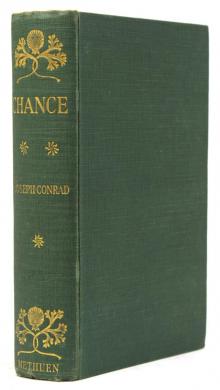 Chance: A Tale in Two Parts
Chance: A Tale in Two Parts Youth
Youth Almayer's Folly
Almayer's Folly The Heart of Darkness and the Secret Sharer
The Heart of Darkness and the Secret Sharer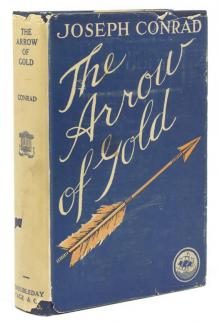 The Arrow of Gold: A Story Between Two Notes
The Arrow of Gold: A Story Between Two Notes The Rescue: A Romance of the Shallows
The Rescue: A Romance of the Shallows The Point Of Honor: A Military Tale
The Point Of Honor: A Military Tale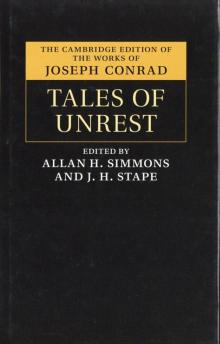 Tales of Unrest
Tales of Unrest Under Western Eyes
Under Western Eyes Gaspar Ruiz
Gaspar Ruiz A Set of Six
A Set of Six Heart of Darkness and the Congo Diary (Penguin Classics)
Heart of Darkness and the Congo Diary (Penguin Classics) Heart of Darkness and Selected Short Fiction
Heart of Darkness and Selected Short Fiction Typhoon
Typhoon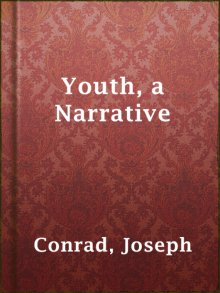 Youth, a Narrative
Youth, a Narrative Tomorrow
Tomorrow The Arrow of Gold
The Arrow of Gold The Shadow Line: A Confession
The Shadow Line: A Confession The Rescue
The Rescue Victory (Echo Library)
Victory (Echo Library) The Brute
The Brute Romance
Romance A Personal Record
A Personal Record Lord Jim: A Tale
Lord Jim: A Tale Heart of Darkness and Selected Short Fiction (Barnes & Noble Classics Series)
Heart of Darkness and Selected Short Fiction (Barnes & Noble Classics Series) Within the Tides
Within the Tides The Secret Sharer and Other Stories
The Secret Sharer and Other Stories Falk
Falk Heart of Darkness and The Secret Sharer
Heart of Darkness and The Secret Sharer Chance
Chance An Anarchist
An Anarchist The Secret Agent: A Simple Tale
The Secret Agent: A Simple Tale The Secret Agent
The Secret Agent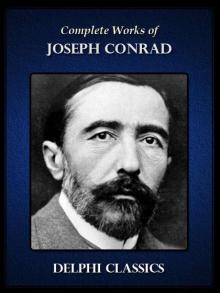 Complete Works of Joseph Conrad (Illustrated)
Complete Works of Joseph Conrad (Illustrated) Heart of Darkness and the Congo Diary
Heart of Darkness and the Congo Diary Notes on Life & Letters
Notes on Life & Letters Typhoon (Single Story)
Typhoon (Single Story)